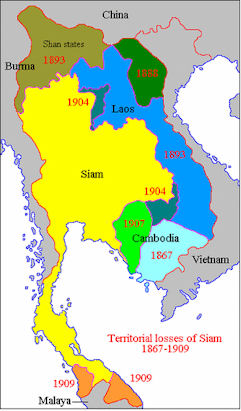

Zitierweise / cite as:
Payer, Alois <1944 - >: Chronik Thailands = กาลานุกรมสยามประเทศไทย. -- Chronik 2004 / B. E. 2547. -- 2. Januar bis Juni. -- Fassung vom 2017-03-20. -- URL: http://www.payer.de/thailandchronik/chronik2004b.htm
Erstmals publiziert: 2012-11-04
Überarbeitungen: 2017-03-20 [Ergänzungen] ; 2016-11-14 [Ergänzungen] ; 2016-04-20 [Ergänzungen] ; 2016-03-15 [Ergänzungen] ; 2016-02-12 [Ergänzungen] ; 2015-09-03 [Ergänzungen] ; 2015-04-05 [Ergänzungen] ; 2014-11-22 [Ergänzungen] ; 2014-09-22 [Ergänzungen] ; 2014-08-14 [Ergänzungen] ; 2014-04-11 [Ergänzungen] ; 2013-04-25 [Ergänzungen und Teilung des Jahrgangs]; 2013-04-20 [Ergänzungen]; 2013-04-09 [Ergänzungen]; 2013-03-27 [Ergänzungen]; 2013-03-21 [Ergänzungen]; 2013-03-16 [Ergänzungen]; 2013-03-11 [Ergänzungen]; 2013-01-30 [Ergänzungen]; 2013-01-13 [Ergänzungen]; 2012-11-13 [Ergänzungen]
©opyright: Dieser Text steht der Allgemeinheit zur Verfügung. Eine Verwertung in Publikationen, die über übliche Zitate hinausgeht, bedarf der ausdrücklichen Genehmigung des Herausgebers.
Dieser Text ist Teil der Abteilung
Thailand von
Tüpfli's Global Village Library
ช้างตายทั้งตัวเอาใบบัวปิดไม่มิด
|
Gewidmet meiner lieben Frau Margarete Payer die seit unserem ersten Besuch in Thailand 1974 mit mir die Liebe zu den und die Sorge um die Bewohner Thailands teilt. |
|
Bei thailändischen Statistiken muss man mit allen Fehlerquellen rechnen, die in folgendem Werk beschrieben sind:
Die Statistikdiagramme geben also meistens eher qualitative als korrekte quantitative Beziehungen wieder.
|
2004-01-04
Vier Terroristen stürmen in der Provinz Narathiwat (นราธิวาส) ein Armee-Arsenal, töten dabei vier Soldaten und rauben Hunderte von Gewehren und anderen Waffen. Gleichzeitig werden 17 Schulen und drei Polizeistationen in Brand gesetzt. Die Straßen zu den Tatorten waren mit Nägeln für Fahrzeuge unpassierbar gemacht worden. Buddhistische Lehrer bekommen Drohbriefe, dass sie die Südprovinzen verlassen sollen.
Abb.: Lage der Provinz Narathiwat (นราธิวาส)
[Bildquelle: OpenStreetMap. -- Creative Commons Lizenz (Namensnennung, share alike)]
"Attacks after 2001 concentrated on installations of the police and military, schools and other symbols of Thai authority in the region were burned. Local police officers of all ranks and government officials were the primary targets of seemingly random assassinations, with 19 policemen killed and 50 incidents related to the insurgency in the three provinces of Pattani, Yala and Narathiwat by the end of 2001. While earlier attacks were typified by drive-by shootings in which patrolling policemen were shot by gunmen on passing motorcycles, this quickly escalated to well coordinated attacks on police establishments, with police stations and outposts ambushed by well-armed groups who subsequently flee with stolen arms and ammunition. In 2002, 75 insurgency-linked attacks amounted to 50 deaths among police and army personnel. In 2003, officials counted 119 incidents. The mounting scale and sophistication of the insurgency eventually prompted the government into a recognition that there was a serious issue in the southern provinces.
On January 4, 2004, unidentified gunmen raided an army ammunition depot in Narathiwat Province in the early morning, and made off with over 100 rifles and other ammunition. In the midst of doing so, all four senior-ranking soldiers guarding the installation were murdered. This incident quickly escalated into large scale violence, with insurgents killing 600 people in a series of bombings and shootings aimed mainly at the police and the military, but also many civilians. Some bombings were directed at non-Muslim Thai residents of the area, leading to an exodus which has damaged the regional economy and increased its isolation from the rest of Thailand.
The Thai response to the insurgency was hampered by a lack of training in counter-insurgency methods, lack of understanding of local culture, and rivalries between the police and the army. Many local police are involved in the local drug trade and other criminal activities, and army commanders from Bangkok treat them with disdain. The army responded to insurgent attacks with heavy-handed raids on Muslim villages, which only resulted in reprisals. Insurgents provoked the inexperienced Thai government into disproportionate responses, generating sympathy among the Muslim populace.
Estimates of the strength of the insurgency vary greatly. In 2004 General Panlop Pinmanee (พัลลภ ปิ่นมณี, 1936 - ) said that there were only 500 hard-core insurgents. Other estimates say there as many as 15,000 armed insurgents. Some Thai analysts believe that foreign Islamist groups are infiltrating the area, and that foreign funds and arms are being brought in, though again, such claims are balanced by an equally large body of opinion suggesting this remains a distinctly local conflict."
[Quelle: http://en.wikipedia.org/wiki/South_Thailand_insurgency#Escalation_of_violence. -- Zugriff am 2012-01-02]
2014-01-15
Es erscheint das Album King Size (คิงไซส์) der Rockband Silly Fools (SF, ซิลลี่ ฟูลส์, gegründet 1997). Das Album steht an der Spitze der Charts.
Das Album auf Spotify:
URI:
spotify:album:0we53PBCJVDMmrmIQ34emB
URL:
https://open.spotify.com/album/0we53PBCJVDMmrmIQ34emB
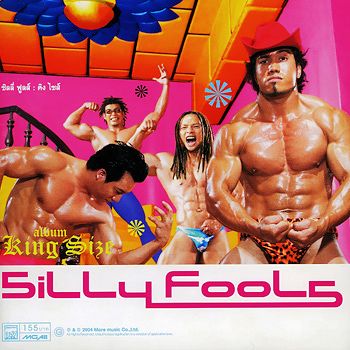
Abb.:
CD-Titel
|
"Silly Fools (auch kurz SF, Thai: ซิลลี่ ฟูลส์) ist eine Rockband in Thailand. GeschichteDie Band wurde 1996 von Chakarin Chuprasoet (จักรินทร์ จูประเสริฐ, 1974 - ) gegründet. 1997 erschien das erste Album „EP“ unter dem Indie-Label Bakery Music. Anschließend wechselte man zum Label More Music, welches zu GMM Grammy, dem größten Label Thailands gehört. Mit „IQ 180“ (ไอ.คิว. 180) folgte dann 1998 das erste vollwertige Album der Silly Fools. Der Durchbruch gelang ihnen 2000 mit dem Album „Mint“ (มินต์). Mit zwei Top-Ten-Songs aus dem Album „King Size“(คิงไซส์), das Album an der Spitze der Charts und einer Tour mit Sek Loso (เสก โลโซ, 1974 - ) war man an der Spitze in Thailand angekommen. Auf „King Size“ hatten Silly Fools eine musikalische Richtungsänderung in Richtung Mainstream vorgenommen. Ein größerer Umbruch kam dann im Jahr 2006. Im Sommer verließ Sänger Toe (โต = ณัฐพล พุทธภาวนา, 1975 - ) die Band. Angeblich seien Auftritte in Pubs, in denen Alkohol ausgeschenkt wird, nicht mit seinem islamischen Glauben vereinbar. Toe gründete kurze Zeit später die Band Hangman (แฮงแมน), was seine Begründung für den Ausstieg bei Silly Fools etwas fragwürdig erscheinen lässt.[1][2] Im November des Jahres traten Silly Fools auf dem Fat Festival in Thailand auf. Silly Fools spielten zwei neue Songs in Englisch. Der Sänger trug während des Auftritts eine Maske auf seinem Gesicht. Das Geheimnis um den neuen Sänger wurde erst im Januar 2007 gelüftet. Am Erscheinungstag der EP „Mini“ gab es eine Limited Edition von 1000 Stück am GMM Grammy Gebäude, dabei wurde der neue Sänger vorgestellt. Es war Benjamin „Chung“ Tuffnell (เบนจามิน จุง ทัฟเนล, 1975 - ), welcher vorher bei der Band Metropol sang. Ben wurde 1975 in Korea geboren und von einer amerikanischen Familie adoptiert. Er arbeitete in Thailand als Lehrer an dem Assumption College (มหาวิทยาลัยอัสสัมชัญ) in Rayong (ระยอง), wo er auch das erste Mal Bekanntschaft mit der Musikszene Thailands machte.[3] Die EP „Mini“ bestand aus fünf Songs, alle in englischer Sprache. Produziert und mixed wurde die EP von Greg Reely, einem Produzenten aus Nordamerika. Nach Erscheinen von „Mini“ ging man dann auf Promotions-Tour durch Kanada und die USA. Im März 2008 erschien das bisher letzte Album von Silly Fools. Nach dem Ausflug ins Englische hat man dieses Album wieder in thailändischer Sprache aufgenommen." [Quelle: http://de.wikipedia.org/wiki/Silly_Fools. -- Zugriff am 2013-04-08] |
2004-01-16

Malaysias Ministerpräsident Abdullah bin Haji Ahmad Badawi (1939 - ) (عبد الله بن حاجّ أحمد بدوي) ist auf Staatsbesuch in Thailand. Er bespricht mit Ministerpräsident Thaksin Fragen der gemeinsamen Sicherheit und des Handels.
2004-01-16 - 2004-01-21
Viertes Weltsozialforum (World Social Forum - WSF) in Mumbai (मुंबई, Indien). 80.000 bis 100.000 Globalisierungsgegner aus 130 Ländern treffen sich. Das Weltsozialforum ist eine Gegenveranstaltung zu den Gipfeln der Welthandelsorganisation (WTO), dem Davoser Weltwirtschaftsforum und den Weltwirtschaftsgipfeln.
Abb.: Lage von Mumbai (मुंबई)
[Bildquelle: OpenStreetMap. -- Creative Commons Lizenz (Namensnennung, share alike)]
Abb.: World Social Forum, Mumbai (मुंबई), 2004
[Bildquelle: Claudio Riccion. -- http://www.flickr.com/photos/ilriccio/135304963/. -- Zugriff am 2012-01-04. -- Creative Commons Lizenz (Namensnennung, keine kommerzielle Nutzung, share alike)]
2004-01-18

Der US-Pharmakonzern Bristol Myers Squibb lockert seine Patentrechte in Thailand für das Anti-AIDS-Medikament Didanosin (Handelsname Videx®). AIDS-Kranke und NGOs hatten gegen Bristol Myers Squibb geklagt. Jetzt ist es möglich, dass das Medikament in Thailand durch die Government Pharmaceutical Organisation (GPO, องค์การเภสัชกรรม) zu einem Bruchteil der Kosten hergestellt wird.
Abb.: Didanosin der Government's Pharmaceutical Organisation (GPO)
"In January 2004 Bristol-Myers Squibb (BMS), a US pharmaceutical group, dropped a long-standing court battle against two Thai people living with HIV/AIDS over the patent for didanosine, an HIV/AIDS treatment drug. BMS decided to withdraw its appeal and give up its exclusive right to produce didanosine in Thailand claiming that it had decided to “dedicate the patent to the people of Thailand.” In October 2002 the Thai Central Intellectual Property and International Trade Court issued a landmark ruling stating that patients have the right to challenge a patent because the “lack of access to medicines due to high prices prejudices the human rights of patients to proper medical treatment.” In coming to this conclusion, the Thai court explicitly referred to the Doha Declaration on TRIPS and Public Health.
The case began in 1999 when the Thai Government Pharmaceutical Organization (GPO) sought a compulsory licence from the Thai Department of Intellectual Property in order to produce a generic version of didanosine for the treatment 700,000 Thai HIV/AIDS patients. This request was supported by a number of local NGOs, the Thai Network for People living with HIV/AIDS (TNP+) and Médecins Sans Frontières (MSF). However, following thinly veiled threats of trade sanctions against Thailand from the US government, the Thai Commerce Ministry refused the licence. In May 2001 the Thai Aids Access Foundation, together with two people living with HIV/AIDS, filed the lawsuit against the BMS patent.
The victory in obtaining this ruling demonstrates that the right to health and the right to life can be protected by challenging patents and not yielding to threats from industrialized countries. In practical terms, the ruling means that GPO should now be able to produce a generic formula of didanosine at considerable cost savings to HIV/AIDS patients.
[Quelle: Nathan Ford, David Wilson, Onanong Bunjumnong and Tido von Schoen Angerer, The Role of Civil Society in Protecting Public Health over Commercial Interests: Lessons from Thailand, The Lancet, Vol. 363, February 2004. -- http://www.3dthree.org/pdf_3D/Guide-075Ch4.pdf. -- Zugriff am 2012-01-02]
2004-01-20
Ein sechsjähriger Bub ist in Thailand der erste Tote durch Vogelgrippe (H5N1). Im Umkreis von 5 km um die befallene Hühnerfarm wird alles Geflügel grausam getötet: 850.000 Stück Geflügel sind bisher getötet worden.
Abb.: Fälle von Menschen mit Vogelgrippe in Asien 2003 - 2005
[Bildquelle: EUROPA Public Health / Wikipedia. -- Public domain]
"In January 2004 a major new outbreak of H5N1 surfaced in Vietnam and Thailand's poultry industry, and within weeks spread to ten countries and regions in Asia, including Indonesia, South Korea, Japan and China. In October 2004 researchers discovered H5N1 is far more dangerous than previously believed because waterfowl were directly spreading the highly pathogenic strain of H5N1 to chickens, crows, pigeons, and other birds and that it was increasing its ability to infect mammals as well. From this point on, avian influenza experts increasingly refer to containment as a strategy that can delay but not prevent a future avian flu pandemic. January
February
- A major new outbreak of H5N1 surfaced in Vietnam and Thailand's poultry industry, and within weeks spread to ten countries and regions in Asia, including Indonesia, South Korea, Japan and China. Intensive efforts were undertaken to slaughter chickens, ducks and geese (over forty million chickens alone were slaughtered in high-infection areas), and the outbreak was contained by March, but the total human death toll in Vietnam and Thailand was twenty three people.
July
- "The Ministry of Public Health in Thailand has confirmed the country's tenth case of H5N1 infection."
August
Fresh outbreaks in poultry were confirmed in Ayutthaya (อยุธยา) and Pathumthani (ปทุมธานี) provinces of Thailand, and Chaohu (巢湖) city in Anhui (安徽省), China. Research identifies the dominant strain of H5N1 as the "Z genotype".
September
- Avian flu was confirmed in Kampung Pasir, Kelantan, Malaysia. Two chickens were confirmed to be carrying H5N1. As a result Singapore has imposed a ban on the importation of chickens and poultry products. Similarly the EU has imposed a ban on Malaysian poultry products. A cull of all poultry has been ordered by the Malaysian government within a 10 km radius of the location of this outbreak. These moves appear to have been successful and since then, Singapore has lifted the ban and Malaysia has requested the OIE declare Malaysian poultry bird flu free.
October
- More cases of H5N1 in humans in Thailand.[3]
November
- Researchers discover H5N1 is far more dangerous than previously believed. "In the past, outbreaks of highly pathogenic avian influenza in poultry began following the primary introduction of a virus, of low pathogenicity, probably carried by a wild bird. The virus then required several months of circulation in domestic poultry in order to mutate from a form causing very mild disease to a form causing highly pathogenic disease, with a mortality approaching 100%. Only viruses of the H5 and H7 subtypes are capable of mutating to cause highly pathogenic disease. In the present outbreaks, however, asymptomatic domestic ducks can directly introduce the virus, in its highly pathogenic form, to poultry flocks." Limiting this conclusion to domestic waterfowl proved to be wishful thinking, as in later months it became clear that nondomestic waterfowl were also directly spreading the highly pathogenic strain of H5N1 to chickens, crows, pigeons, and other birds and that it was increasing its ability to infect mammals as well. From this point on, avian influenza experts increasingly refer to containment as a strategy that can delay but not prevent a future avian flu pandemic.
December
- The U.S.'s National Institutes of Health's (NIH) National Institute of Allergy and Infectious Diseases's (NIAID) Influenza Genome Sequencing Project to provide complete sequence data for selected human and avian influenza isolates begins.
[Quelle: http://en.wikipedia.org/wiki/Global_spread_of_H5N1_in_2004. -- Zugriff am 2012-01-02]
- "[F]irst human case of H5N1 [is] detected in Viet Nam since early September"."
2004-01-21
Premiere des Films The Bodyguard (บอดี้การ์ดหน้าเหลี่ยม) von Petchtai Wongkamlao (เพ็ชรทาย วงศ์คำเหลา, 1965 - )
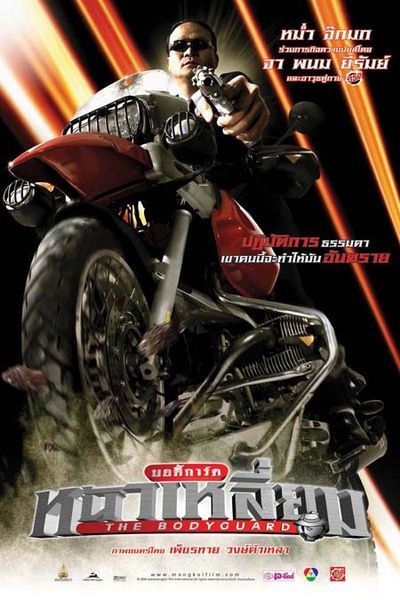
Abb.: Plakat
[Bildquelle: th.Wikipedia. -- Fair use]
|
The Bodyguard (Thai: บอดี้การ์ดหน้าเหลี่ยม) ist ein thailändischer Actionfilm aus dem Jahr 2004. Regie führte Entertainer Petchtai Wongkamlao (เพ็ชรทาย วงศ์คำเหลา, 1965 - ), der auch das Drehbuch schrieb und die Hauptrolle spielte. Der Streifen fand 2007 eine Fortsetzung. HandlungDer erfahrene Personenschützer Wong Kom (วงศ์คม) kann den Tod eines thailändischen Industriellen trotz erheblicher Gegenwehr nicht verhindern, als dieser bei einer geplanten Unterzeichnung einer Firmenfusion einem heimtückischen Anschlag zum Opfer fällt. Der verletzte Geschäftsmann Chot Petchpantakarn erliegt im Krankenhaus seinen schweren Verletzungen. Als Drahtzieher entpuppt sich der leibliche Bruder des Opfers Choung (ช่วง เพชรพันธการ), der als leitendes Vorstandsmitglied die Führung des Unternehmens an sich reißen will. Am Tage der feierlichen Beisetzung wird der Leibwächter vom trauernden Sohn und Alleinerben Chaichol (ชายชล เพชรพันธการ) ungnädig entlassen, da dieser ihn für das Versagen seines schutzbefohlenen Vaters verantwortlich macht, ohne allerdings die näheren Umstände zu kennen. Wenig später wird auch der Sohn des Toten zur Zielscheibe, doch das Attentat misslingt und der Lebemann und Playboy kann leicht verletzt in einem Müllwagen fliehen. Fortan wird der flüchtige Millionenerbe von den Gangstern um Arthit (อาทิตย์) gesucht, die ihn anfänglich bei Wong Kom vermuten, so dass dieser bald von einem bewaffneten Killerkommando aufgesucht wird. Der Personenschützer wehrt sich erfolgreich gegen die Mördertruppen und erkennt, dass Chaichol in Gefahr ist. Fortan macht er sich im Wettlauf mit den Gangstern auf die Suche nach dem Vermissten, um seinen Fehler wieder gutzumachen bzw. um sich bei der Familie des Ermordeten zu rehabilitieren. Derweil wird der verletzte und bewusstlose Chaichol auf einer Müllkippe der Millionenmetropole Bangkok gefunden und zu der Rettungssanitäterin Pok gebracht, die mit ihrer Familie in ärmlichen Verhältnissen am Rande der Gesellschaft lebt. Nachdem der reiche Mann das Bewusstsein wiedererlangt, gibt er sich zur Tarnung als diebischer Straftäter aus, seine nichtsahnenden Helfer gewähren ihm so eine sichere und anonyme Unterkunft. Der Lebemann taucht in dem Armenviertel unter falscher Identität unter, lernt so das einfache Leben der teils skurrilen Bewohner kennen und verliebt sich in die attraktive Pok (ป๊อก), die sich für soziale Belange engagiert. Pok ist der geläuterte Neuankömmling sofort sympathisch, es entwickelt sich eine zarte Romanze bis das Pärchen urplötzlich von bewaffneten Gangstern in einem Einkaufscenter gestellt und als Geisel genommen wird. Die Lage ist angespannt, das Gebäude wird von herbeigerufenen Polizeieinheiten umstellt, die jedoch einfältig und machtlos erscheinen, unfähig die prekäre Situation zu meistern. Kurzerhand nimmt Wong Kom die Sache selbst in die Hand und befreit den reichen Knaben aus den Händen der brutalen Kriminellen, überlässt Pok jedoch ihrem Schicksal. Chaichol ist über den ungewissen Verbleib seiner Angebeteten zutiefst besorgt, flüchtet blind vor Liebe aus dem gut bewachten Anwesen in die Arme der Kriminellen. In Gegenwart von Choung, dem zwielichtigen Onkel des Millionenerben und Initiator des erpresserischen Komplotts, erzwingt eine Schar dubioser Geschäftsleute die Unterschrift Chaichols unter eine handelsrechtliche Vollmacht, die die Konzernführung an Choung übertragen soll. Um das Dokument zu beglaubigen wird allerdings der Fingerabdruck von Wong Kom auf dem Siegel des Schriftstückes benötigt. Dieser verweigert jedoch die Mitarbeit und dezimiert der Reihe nach die anwesenden Gangster. Choung wird der Justiz übergeben. Am Ende des Films entschuldigt sich Chaichol bei seinem Lebensretter Wong Kom. Wenige Augenblicke später teilt der junge Mann seiner erstaunten Mutter mit, dass er eine gewisse Pok ehelichen will, die er in den letzten Szenen des Films nichtsahnend in dem Armenviertel aufsucht um seiner Auserwählten einen Heiratsantrag zu machen, den seine große Liebe bereitwillig annimmt. Besetzung
„Eine recht ruppige Actionkomödie voller Zoten, in deren Verlauf der Millionenerbe zwar geläutert wird, wobei dieser Handlungsstrang aber zugunsten aufgesetzter Action sträflich vernachlässigt wird.“ – Lexikon des Internationalen Films [1] [Quelle: http://de.wikipedia.org/wiki/The_Bodyguard_%282004%29. -- Zugriff am 2013-03-21] |
2004-01-27
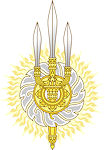
Seine Majestät, der König erhält vom Department of Intellectual Property das thailändische Patent für "Liquid pressure controller"
2004-02
Der Profigolfer Thongchai Jaidee (ธงชัย ใจดี, 1969 - ) beendet als erster Thai ein Turnier der European Open, das Carlsberg Malaysian Open.
|
"Thongchai Jaidee (Thai: ธงชัย ใจดี - [tʰoŋ-ʧai ʤai-diː], * 8. November 1969 in der Provinz Lopburi (ลพบุรี), Zentral-Thailand) ist ein thailändischer Profigolfer der Asian Tour und der European Tour. WerdegangThongchai Jaidee begann relativ spät, mit 16 Jahren, Golf zu spielen, ging 1989 zur Königlich Thailändischen Armee und wurde zum Fallschirmjäger ausgebildet. Er hatte eine erfolgreiche Amateurkarriere mit fünf Turniersiegen, darunter die Amateurmeisterschaften von Pakistan, Thailand und Singapur und startete erst 1999 seine Laufbahn als Berufsgolfer. Thongchai wandte sich der Asian Tour zu, war bald erfolgreich und gewann die Geldranglisten der Jahre 2001, 2004 und 2009. Im Februar 2004 war er der erste thailändische Golfer, der ein Turnier der European Tour siegreich beendete, die Carlsberg Malaysian Open, ein Event, das gemeinsam mit der Asian Tour veranstaltet wurde. Im Jahr darauf konnte Thongchai diesen Titel verteidigen. Für das Masters 2006 erhielt er eine Einladung und wurde zum ersten Thailänder, der alle vier Majors gespielt hat. In der Golfweltrangliste lag er zeitweilig unter den Top 100, sein bestes Ranking in der European Tour Order of Merit war ein 19. Platz in der Saison 2009. Thongchai wurde ins asiatische Team für die 2006 erstmals ausgetragene Royal Trophy einberufen, einem Mannschaftsbewerb nach Art des Ryder Cups zwischen Asiens und Europas Elitegolfern. Im Dynasty Cup stand er in den bisher ausgetragenen Begegnungen – 2003 und 2005 – im siegreichen asiatischen Team. Thongchai Jaidee ist seit 1998 mit Namfon Jaidee (น้ำฝน ใจดี) verheiratet. Die beiden haben ein Kind und ihren Wohnsitz in Lopburi, Thailand." [Quelle: http://de.wikipedia.org/wiki/Thongchai_Jaidee. -- Zugriff am 2013-04-20] |
2004-01-28
Minister aus 10 asiatischen Staaten, den USA und der EU beraten in Bangkok gemeinsame Maßnahmen gegen die Ausbreitung der Vogelgrippe.
2004-02-03
Verhängung des Kriegsrechts über die südlichsten Provinzen, Narathiwat (นราธิวาส), Yala (ยะลา) und Pattani (ปัตตานี).
Abb.: Provinzen unter Kriegsrecht
[Bildquelle: Adam Carr / Wikipedia. -- Public domain]
2004-02-04

Mark Zuckerberg (1984 - ) eröffnet Facebook. Ende 2012 gibt es in Thailand 18 Mio. Facebook-Nutzer.
Abb.: Mark Zuckerberg
[Bildquelle: DonkeyHotey. -- http://www.flickr.com/photos/donkeyhotey/4616277382/. -- Zugriff am 2013-01-30. -- Creative Commons Lizenz (Namensnennung, share alike)]
2004-02-09
Weitere 800 Mann des Volunteer Defence Corps (Or Sor) (อส. = กองอาสารักษาดินแดน) sollen in den drei südlichsten Provinzen rekrutiert werden.
Abb.: ®Logo
2004-02-10
In Bangkok Feiern zum 50-jährigen Bestehen des Volunteer Defence Corps (Or Sor) (อส. = กองอาสารักษาดินแดน).
2004-02-20
Premiere des Films Pisaj (คน ผี ปีศาจ) von Chookiat Sakveerakul (ชูเกียรติ ศักดิ์วีระกุล, 1981 - )
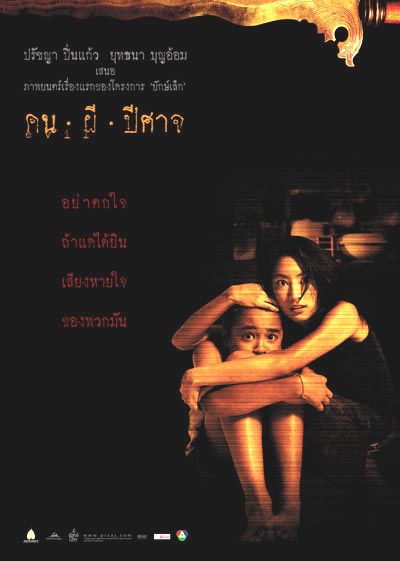
Abb.: Plakat
[Bildquelle: Wikipedia. -- Fair use]
|
"Pisaj or Evil (Thai: คน ผี ปีศาจ; RTGS: Khon Phi Pisat; literally Human, Ghost, Demon) is a 2004 Thai horror film directed by Chookiat Sakveerakul (ชูเกียรติ ศักดิ์วีระกุล, 1981 - ). PlotAfter her parents are killed in a drive-by shooting, a young woman named Oui (อุ้ย) has no place else to go. She shows up at a printing house run by her Aunt Bua (ป้าบัว) and is given the task of caring for her aunt's grandson, a young boy named Arm (อาร์ม), a kid who sees ghosts. Oui suffers from hallucinations, brought on by the trauma of seeing her parents killed, and is taking medications. And Aunt Bua is involved in some sort of mysticism, and keeps a strange shrine in the house. With the drug war by prime minister Thaksin Shinawatra (ทักษิณ ชินวัตร, 1949 - ) as a subtext, many threads in this strange ghost story are somehow tied together. Cast
[Quelle: http://en.wikipedia.org/wiki/Pisaj. -- Zugriff am 2013-03-21] |
2004-02-21
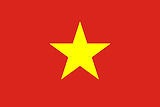
Ministerpräsident Thaksin und der vietnamesische Ministerpräsident Phan Van Khai eröffnen in Ban Na Chok (บ้านนาจอก) bei Nakhon Phanom (นครพนม) das Thailand-Vietnam Friendship Village. In Ban Na Chok lebte von 1924 - 1931 der vietnamesische Kommunistenführer Ho Chi Minh (Hồ Chí Minh, 1890 - 1969). Das Village dokumentiert die Beziehungen zwischen Thailand und Vietnam. Ebenfalls zugänglich ist das Haus, in dem Ho Chi Minh wohnte.
Abb.: Lage von Nakhon Phanom (นครพนม)
[Bildquelle: OpenStreetMap. -- Creative Commons Lizenz (Namensnennung, share alike)]
Abb.: Ho Chi Minh (Hồ Chí Minh), Briefmarke, Sowjetunion 1990
[Bildquelle. Wikipedia. -- Public domain]
2004-02-22
Profigolfer Thongchai Jaidee (ธงชัย ใจดี, 1969 - ) gewinnt das Malaysian Open.
"Thongchai Jaidee (Thai: ธงชัย ใจดี - [tʰoŋ-ʧai ʤai-diː], * 8. November 1969 in der Provinz Lopburi (ลพบุรี), Zentral-Thailand) ist ein thailändischer Profigolfer der Asian Tour und der European Tour. Werdegang
Thongchai Jaidee begann relativ spät, mit 16 Jahren, Golf zu spielen, ging 1989 zur Königlich Thailändischen Armee und wurde zum Fallschirmjäger ausgebildet. Er hatte eine erfolgreiche Amateurkarriere mit fünf Turniersiegen, darunter die Amateurmeisterschaften von Pakistan, Thailand und Singapur und startete erst 1999 seine Laufbahn als Berufsgolfer.
Thongchai wandte sich der Asian Tour zu, war bald erfolgreich und gewann die Weltranglisten der Jahre 2001 und 2004. Im Februar 2004 war er der erste thailändische Golfer, der ein Turnier der European Tour siegreich beendete, die Carlsberg Malaysian Open, ein Event, das gemeinsam mit der Asian Tour veranstaltet wurde. Im Jahr darauf konnte Thongchai diesen Titel verteidigen. Für das Masters 2006 erhielt er eine Einladung und wurde zum ersten Thailänder, der alle vier Majors gespielt hat.
In der Golfweltrangliste liegt er unter den Top 100, sein bestes Ranking in der European Tour Order of Merit war ein 37. Platz in der Saison 2006. Thongchai wurde ins asiatische Team für die 2006 erstmals ausgetragene Royal Trophy einberufen, einem Mannschaftsbewerb nach Art des Ryder Cups zwischen Asiens und Europas Elitegolfern. Im Dynasty Cup stand er in den bisher ausgetragenen Begegnungen – 2003 und 2005 – im siegreichen asiatischen Team.
Thongchai Jaidee ist seit 1998 mit Namfon Jaidee verheiratet. Die beiden haben ein Kind und ihren Wohnsitz in Lopburi, Thailand."
[Quelle: http://de.wikipedia.org/wiki/Thongchai_Jaidee. -- Zugriff am 2012-01-02]
2004-02-24
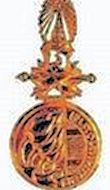
Zu National Artists (ศิลปินแห่งชาติ) werden ernannt:
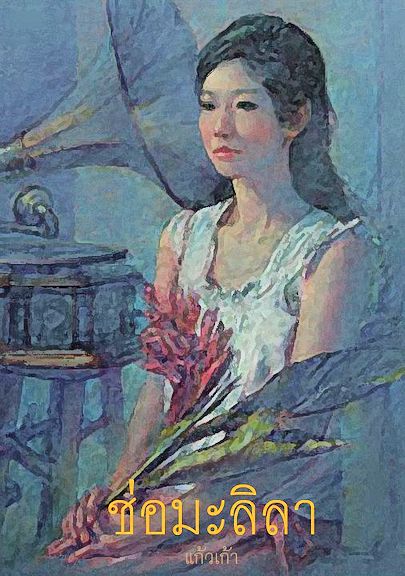
Abb.: Einbandtitel eines Buchs von Vinita Diteeyont (คุณหญิงวินิตา ดิถียนต์
= ว.วินิจฉัยกุล = แก้วเก้า = รักร้อย)
[Fair use]
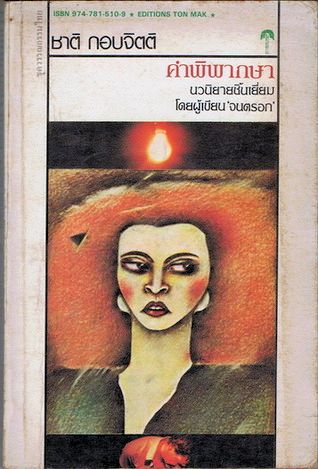
Abb.: Einbandtitel eines Buchs von Chart Kobjitti
(นายชาติ กอบจิตติ)
[Fair
use]
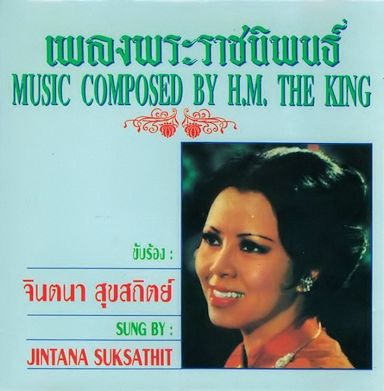
Abb.: CD-Titel von Jintana Palkawong Na Ayudhya (นางจินตนา ปาลกะวงศ์ ณ
อยุธยา = Jintana Suksathit - จินตนา
สุขสถิตย์)
[Fair use]
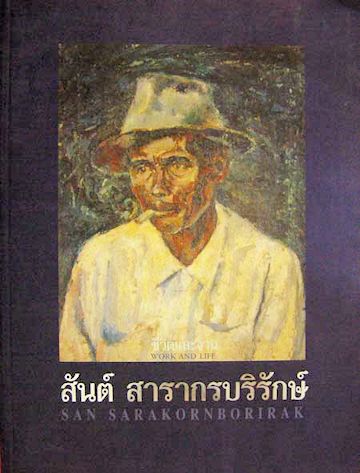
Abb.: Einbandtitel eines Buchs über Sant Sarakornborirak (นายสันต์ สารากรบริรักษ์)
[Fair use]
2004-02-25
Mit dem Album "I believe" gelingt Tata Young (ทาทา ยัง, 1980 - ) der internationale Durchbruch.
Künstlerlink auf Spotify:
URI:
spotify:artist:1gTpnrpyXF3zutKZDcUCiU
URL:
https://open.spotify.com/artist/1gTpnrpyXF3zutKZDcUCiU

Abb.:
Japanischer CD-Titel
[Fair use]
|
"I Believe is the English language debut album by Tata Young (ทาทา ยัง, 1980 - ) in 2004. This album is a big hit throughout Asia. The song, "I Believe", topped the charts in Hong Kong, was a major success in Southeast Asia, and was a top-20 hit throughout the rest of East Asia. "Sexy, Naughty, Bitchy" broke the top 10 on the Oricon ((株式会社オリコン) charts in Japan and was one of the most successful Asian singles of the year; like many of Tata's other singles, "Sexy, Naughty, Bitchy" dominated the airwaves in Southeast Asia. So far the album has sold 1.2 million copies throughout the world." [Quelle: http://en.wikipedia.org/wiki/I_Believe_%28Tata_Young_album%29. -- Zugriff am 2013-04-15] |
| "Tata Young (Thai
ทาทา ยัง; * 14.
Dezember 1980 in Bangkok; eigentlich Amita Marie Young) ist eine
thailändische Popsängerin. Sie wurde als Tochter eines US-Amerikaners
und einer Thai geboren. Karriere Im Alter von elf Jahren nahm Tata am Thailand Junior Singing Contest teil und ging als Siegerin aus 5.300 Mitbewerbern hervor. Dieser Erfolg legte den Grundstein ihrer Karriere. 1994, im Alter von 14 Jahren, unterschrieb sie einen Plattenvertrag bei GMM Grammy, dem größten thailändischen Plattenlabel. 1995 erschien ihr Debütalbum „Amita Tata Young“ in thailändischer Sprache. Schon früh machte sie sich einen Namen über die Landesgrenzen Thailands hinaus. Von der chinesischen Regierung wurde sie 1997 ausgesucht, an einem Konzert anlässlich der Übergabe Hong Kongs von Großbritannien an China aufzutreten. Dabei trat sie unter anderem neben Künstlern wie Wet Wet Wet, Michael Learns to Rock, Lisa Stansfield, All-4-One und den Brand New Heavies auf. Im Jahr 2004 wechselte Tata von BEC TERO Records zu Columbia Records Sony BMG und nahm dort ihr erstes englischsprachiges Album „I Believe“ auf, womit ihr dann der Durchbruch in ganz Asien gelang. Am 24. August 2006 erschien nach „I Believe“ ihr zweites englischsprachiges Album „Temperature Rising“, welches ebenfalls ein riesiger Erfolg wurde. Der bisher letzte Höhepunkt ihrer Karriere war ihr Auftritt bei der Eröffnungsfeier zur Fußball-Asienmeisterschaft 2007, wo sie einige ihrer größten Hits sang. Die Eröffnungsfeier wurde in ganz Asien und andere Teile der Welt live übertragen. Im März 2008 erschien ihr bisher letztes Album „One Love“, welches sie wieder in thailändischer Sprache einsang. Tata Young dürfte heute wohl die im asiatischen Raum bekannteste thailändische Künstlerin sein. In Thailand selbst gilt sie als eine der einflussreichsten Frauen. Jedoch hat sie auch in Thailand ihre wohl größten Gegner. Diese werfen ihr vor, sie habe einen negativen Einfluss auf die thailändische Jugend. Momentan arbeitet Tata an ihrem europäischen „International Album“, geplante Veröffentlichung ist Februar 2010." [Quelle: http://de.wikipedia.org/wiki/Tata_Young. -- Zugriff am 2011-11-14] |
2004-02-28

NZZ: Thailands Süden kommt nicht zur Ruhe : Ungeschicktes Vorgehen der Regierung gegen Extremisten
"Die Äußerungen der Regierung in Bangkok zu den Vorfällen und die ergriffenen Maßnahmen haben die Lage im Süden bisher eher verschlimmert als beruhigt. Nach der Ausrufung des Kriegsrechts, welches Verhaftungen von Verdächtigen und Hausdurchsuchungen ohne richterliche Befehle ermöglicht, ist es immer wieder zu Übergriffen der Sicherheitskräfte gekommen, namentlich gegen die zahlreichen islamischen Schulen, in Südthailand «Pondok» genannt. Viele der hiesigen Muslime ziehen es vor, ihren Nachwuchs in diesen Schulen statt in den an sich weltlichen, teilweise aber buddhistisch ausgerichteten Staatsschulen unterrichten zu lassen. Dass bei der Verfolgung angeblich verdächtiger Missetäter immer wieder Soldaten und Polizisten, ohne Vorankündigung und manchmal mit Schützenpanzern, in «Pondoks» eingedrungen sind, hat zu Verbitterung in breiten, zuvor durchaus nicht staatsfeindlichen Bevölkerungskreisen geführt. Das Feuer der Empörung noch geschürt hat Ministerpräsident Thaksin mit der Äußerung, alle «Pondoks», die nicht wie die staatlichen Schulen täglich die Landesflagge hissten, müssten fortan mit der Schließung wegen «landesverräterischer Gesinnung» rechnen.
Kein Wunder, dass die mysteriösen Staatsgegner, über deren Zahl, Identität und Ideologie weiterhin nichts Offizielles bekannt ist, ihrerseits erneut die staatlichen Schulen zum Ziel ihrer nicht lange auf sich warten lassenden Reaktion machten. Mit Drohbriefen und Attentaten erzwangen sie die mehrmalige vorübergehende Schließung von mehreren hundert Staatsschulen und zuletzt sogar die Vorverlegung der Abschlussprüfungen und die Schließung der Schulen in allen drei Südprovinzen lange vor Semesterende."
[Quelle: NZZ Internationale Ausgabe. -- 2004-02-28. -- S. 6. -- Fair use]
2004-02-29
Premiere des Films Homrong (โหมโรง, The Overture) von Ittisoontorn Vichailak (อิทธิสุนทร วิชัยลักษณ์, 1962 - ). Der Film basiert auf dem Leben von Luang Pradit Pairoh (หลวงประดิษฐไพเราะ, 1881 - 1953) (Sorn Silpanleng - ศร ศิลปบรรเลง).
Abb.: Filmplakat, 2005
[Bildquelle: th.Wikipedia. -- Fair use]
Abb.: Ranad-ek (ระนาดเอก)
[Bildquelle: Paul =12 / Wikipedia. -- GNU FDLicense]
"The Overture (Thai: โหมโรง or Hom rong) is a 2004 Thai musical-drama film. A fictionalised account based on the life story of Thai palace musician Luang Pradit Phairoh (หลวงประดิษฐไพเราะ, 1881 - 1953) (Sorn Silapabanleng - ศร ศิลปบรรเลง), it follows the life of a Thai classical musician from the late 19th century to the 1940s. The film was the winner of several awards in Thailand and was the country's official selection for the Academy Award for Best Foreign Language Film. It was directed by Ittisoontorn Vichailak (อิทธิสุนทร วิชัยลักษณ์, 1962 - ) and producers included Nonzee Nimibutr (นนทรีย์ นิมิบุตร, 1962 - ) and Chatrichalerm Yukol (ชาตรีเฉลิม ยุคล, 1942 - ). The film was also credited with a revival in the popularity of piphat (ปี่พาทย์) – Thai classical music. Plot
Starting out in the 1940s, the story finds the elder Sorn bed-ridden. To an old friend, he recalls his childhood growing up in 1880s Siam, during the reign of King Chulalongkorn and the action flashes back to that time.
Sorn's brother was a gifted classical musician, so gifted in fact that it caused a rivalry with other musicians that ended in Sorn's brother's death. Because of that, Sorn's father bars the boy from taking up the ranad-ek (ระนาดเอก, Thai xylophone). However, Sorn, who has shown a talent for the instrument since an early age, defies his father and sneaks off to practice playing in an abandoned temple in the jungle.
Eventually, he becomes so skilled at the instrument that his father lets him play after he speaks to a monk who advises him that he should not deny him the right to play ranad-ek. Sorn excels in his studies to the point where he is noticed by other bands. They ask for his presence to complete. He becomes arrogant and misses practice telling his father that his faith isn't misplaced. His father teaches his place by putting him on the Kong-wong. At the competition, the competitor scares his uncle (the substitute on ranad-ek) and becomes clear that the competitor has superior skill. As their playing, the judge realises that Sorn isn't playing on the ranad-ek and calls the teacher out on the fact that if they have a good player, might as well bring out the good material because then you can lose with dignity. The band starts over and plays the same song, but it is obvious that Sorn is skilled. He wins every competition as a boy. So One day, in a local village, Sorn and his ensemble are set up to perform in a courtyard. Across the courtyard is another ensemble, led by a fierce-looking bearded ranad-ek player dressed in black. As the rival player starts to perform, a storm whips up adding to the ominous mood of the setting. Sorn is disturbed by his fiery ability to play and wants to learn like him.
But Sorn's talent does not go unnoticed and he is soon chosen to play for a local nobleman and is sent to the palace for more formal music training. There he meets an older man that he thinks is a palace caretaker, or some type of lowly person that does not know about music. However, later, when Sorn is to meet his new teacher, Master Tian, it is revealed to be the old man he met earlier. Tian turns out to be a strict teacher and instructs Sorn on all the instruments of the Thai classical music ensemble. At one point, Sorn is punished for being too flashy a player and is made to relinquish the ranad-ek to an inferior player, much to the dismay of other members in his ensemble, as well as a high palace official watching the performance.
So when it comes time for the kingdom's musical competition, it is Sorn who is again the lead player. However, Sorn must overcome his fear at the competition, because he must again face the fierce, bearded ranad-ek performer.
The story flashes back forward to the 1940s again, showing Sorn as a respected teacher. One day Sorn's son has a piano moved into his father's studio. The expectation is that his father will be furious at having a newfangled Western instrument brought into his house. But instead of being mad, he instructs his son to play a tune on the piano. The elder Sorn then takes up his ranad-ek mallets and improvises with his son, blending Thai and Western music.
This is during the rule of the dictator, Field Marshal Plaek Pibulsonggram (แปลก พิบูลสงคราม, 1897 - 1964), whose government called for the accelerated modernisation of Thailand. As a result, performances of traditional Thai music, dance and theatre were frowned upon. In Sorn's neighbourhood, the orders are enforced by Lieutenant-Colonel Veera.
Sorn teaches the Lieutenant a nation can only withstand outside forces if their nation is strong. For that to happen, they must believe in themselves. No matter what, they must protect their heritage and honor it regardless of what they are to become. Sorn plays not only to defy the rules, but to teach a lesson about culture and heritage.
CastReception
- Anuchyd Sapanphong (อนุชิต สพันธุ์พงษ์, 1979 - ) as younger Sorn (ศร)
Adul Dulyarat (อดุลย์ ดุลยรัตน์, 1932 - ) as elderly Sorn (ศร)
- Pongpat Wachirabunjong (พงษ์พัฒน์ วชิรบรรจง, 1961 - ) as Lt Col Veera (พันโท วีระ)
- Narongrit Tosa-nga (ณรงค์ฤทธิ์ โตสง่า) as Khun In (ขุนอิน)
- Phoovarit Phumpuang (ภูวฤทธิ์ พุ่มพวง) as Terd (เทิด)
- Somlek Sakdikul (สมเล็ก ศักดิกุล, 1953 - ) as Master Tian (ครูเทียน)
After a poor showing at the box office on opening weekend, The Overture was pulled from many theaters. However, after word of mouth spread and discussions flourished on Internet forums such as Pantip.com, the film was brought back and become a sensation that won numerous awards and sparked renewed interest in Thai classical music. Captivated by the film's nationalistic, historical and cultural themes, the film was embraced by Royal Family and the Thai government, which used it as a promotional tool. It was one of the most popular Thai films of 2004.[2][3]
[...]
SoundtrackThe original score was composed by Chatchai Pongprapaphan (ชาติชาย พงศ์ประภาพันธุ์), with Thai classical music performed by Chaibhuk Bhutrachinda (ชัยภัค ภัทรจินดา), the Korphai Ensemble (กอไผ่) and Narongrit Tosa-nga (ณรงค์ฤทธิ์ โตสง่า).
Narongrit, who portrayed Khun-In in the film, is a professional musician and a gifted player of the ranad-ek (Thai xylophone) and actually performed his own ranad-ek parts in the film.
The Overture won Best Music at the Star Entertainment Awards 2004 and Bangkok Critics Assembly Awards.
A soundtrack album was jointly released in 2004 by Gimmick Film, Cinemasia, Prommitr Production and Sahamongkol Film International, but has since gone out of print."
[Quelle: http://en.wikipedia.org/wiki/The_Overture. -- Zugriff am 2011-11-02]
2004-03
Wegen der heftigen Proteste der Beschäftigten und anderer zieht Ministerpräsident den Plan, die Electricity Generating Authority of Thailand (EGAT, การไฟฟ้าฝ่ายผลิตแห่งประเทศไทย) zu privatisieren, zurück.
Abb.: ®Logo
2004-03-12
Somchai Neelaphaijit (สมชาย นีละไพจิตร, geb. 1951), Vorsitzender der Muslim Lawyers Association, verschwindet spurlos.
Abb.: Somchai Neelaphaijit (สมชาย นีละไพจิตร)
[Bildquelle: th.Wikipedia. -- Fair use]
"Somchai Neelapaijit (Thai - สมชาย นีละไพจิตร) (May 13, 1951 - ??), a Thai Muslim-lawyer and human rights activist, disappeared on March 12, 2004 during Thaksin Shinawatra's regime. Strongly suspected to be deceased, he is still the subject of an investigation launched in 2004. Ousted Thai prime minister Thaksin Shinawatra is believed by many interested in the case to have played a part in the disappearance and what some are certain is a murder. While a body has not yet been located, motive was thought to be Somchai's representation of Muslim defendants in terrorism cases. The day after Somchai's disappearance, concerns were publicly raised, but Thaksin at the time said, "Oh, don't worry. I understand he had a fight with his wife, and will probably be back home in a day or two."" [Quelle: http://en.wikipedia.org/wiki/Somchai_Neelaphaijit. -- Zugriff am 2012-01-02]
Abb.: Angkhana Neelaphaijit (อังคณา นีละไพจิตร), 2009
[Bildquelle: Looknarm / Wikipedia. -- GNU FDLicense]Seine Ehefrau, Angkhana Neelaphaijit (อังคณา นีละไพจิตร, 1956 - ) ist seither als Bürgerrechtlerin aktiv.
"Angkhana Neelaphaijit (Thai: อังคณา นีละไพจิตร) is a Thai human rights activist and the wife of disappeared human rights lawyer Somchai Neelaphaijit (สมชาย นีละไพจิตร).[1] Amnesty International described her as "a leading human rights defender in Southern Thailand".[1] Husband's disappearance
In the early 2000s, Southern Thailand suffered a wave of unrest, including an ethnic separatist insurgency. In 2003, four Thai Muslims--Waemahadi Wae-dao, a doctor; Maisuru Haji Abdulloh, a school owner; his son, Muyahid; and a manual labourer, Samarn Wae-kaji--were arrested and charged with planning bombings for the militant Islamic organization Jemaah Islamiyah (لجماعة الإسلامية).[2] Angkhana's husband Somchai was responsible for their defense, and accused state security forces of having abused and tortured the men in custody. According to Angkhana, he subsequently reported harassment and threats by police.[3] On 24 March 2004, a group of men seized Somchai as he left a hotel in a Bangkok suburb, forcing him into a vehicle; his current whereabouts are unknown.[4]
Investigation and trialAngkhana pursued a court case against the officers she alleged to responsible for her husband's disappearance, but was frustrated at what she perceived to be a government cover-up.[4] Police officials refused to share relevant records with her, citing national security, leading the New York Times to describe the truth as "hidden behind a wall of official obscurity."[4] Angkhana also reported a police harassment and anonymous threats, recalling those allegedly sent to her husband before his disappearance.[4] She eventually filed a complaint with the United Nations, in which she stated, "We do not see any genuine goodwill from the authorities."[4]
In 2006, Thai prime minister Thaksin Shinawatra stated that Somchai Neelaphaijit was dead and may have been killed by state security forces.[5] On 12 January 2006, one policeman was jailed for having "illegally detained" Somchai, but four others were acquitted.[5] Angkhana and several international human rights groups "denounced the verdict."[5]
On 2 August 2009, bone fragments were located in the Mae Klong river (แม่น้ำแม่กลอง) believed to belong to Somchai.[6] In September 2010, more than six years after her husband's disappearance, Angkhana told reporters, "I haven't given up my attempts to call for justice for my husband... No matter which party controls the government, I ask it to help investigate the case."[7]
On 17 March 2011, after several delays, a Thai appeals court acquitted Ngern Thongsuk, the only convicted defendant in the case, saying that it had not been conclusively determined whether Somchai had died.[8] Following the verdict, Angkhana told reporters she "would continue to fight for justice and take the case to the Supreme Court."[8] The Asian Human Rights Commission condemned the verdict and renewed calls for police to investigate continued threats against Angkhana and her family.[9]
Ongoing work and recognitionAngkhana currently serves as the chairwoman of the Working Group for Justice and Peace, and continues to investigate allegations of police abuse in Southern Thailand.[10] Amnesty International and Front Line report that her safety continues to be threatened,[1][11] and in 2009, her car was robbed of documents relating to one of her cases.[12]
In 2006, Angkhana, along with Malalai Joya (ملالۍ جویا) of Afghanistan, won the Gwangju Prize for Human Rights (광주인권상), which honors "individuals, groups or institutions in Korea and abroad that have contributed in promoting and advancing human rights, democracy and peace through their work".[13] The award cited her "unrelenting" efforts for justice and "unsparing" criticism of government authorities.[14] On 11 March of the same year, she received the Asian Human Rights Defender Award of the Asian Human Rights Commission on her husband's behalf; the award's press release also praised her "role as an articulate and courageous spokesperson for the families of disappeared persons in Thailand".[15]
In 2011, Josefina Bergsten's documentary "UNJUST", which prominently features Angkhana's story, was given a Special Jury Award at the Hague's Movies that Matter Festival.[16]"
[Quelle: http://en.wikipedia.org/wiki/Angkhana_Neelaphaijit. -- Zugriff am 2012-10-07]
2004-03-14
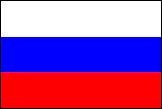
Wladimir Wladimirowitsch Putin (Владимир Владимирович Путин, 1952 - ) wird als Präsident Russlands wiedergewählt.
Abb.: Wladimir Wladimirowitsch Putin (Владимир Владимирович Путин)
[Bildquelle: DonkeyHotey. -- http://www.flickr.com/photos/donkeyhotey/5684702096/. -- Zugriff am 2012-01-04. -- Creative Commons Lizenz (Namensnennung, share alike)]
2004-03-15

Der Volkskongress Chinas setzt den Schutz von Privateigentum in die Verfassung.
2004-03-17


Seine Majestät, der König erhält von der University of North Texas (USA) den "Doctor of Music Performance and Composition honoris causa"
Abb.: Lage der University of North Texas
[Bildquelle: OpenStreetMap. -- Creative Commons Lizenz (Namensnennung, share alike)]
Abb.: Doctor of Music Performance and Composition honoris causa, 2004-03-17
2004-03-20
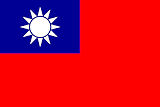
In Taiwan wird Präsident Chen Shui-bian (陳水扁, 1950 - ) wiedergewählt.
Abb.: Lage von Taiwan
[Bildquelle: OpenStreetMap. -- Creative Commons Lizenz (Namensnennung, share alike)]
Abb.: Chen Shui-bian (陳水扁), 2007
[Bildquelle: Rico Shen / Wikimedia. -- GNU FDLicense]
2004-03-21

Parlamentswahlen in Malaysia: die Koalition Barisan Nasional (国民阵线 / தேசிய முன்னணி / National Front) gewinnt 198 der 219 Sitze der Nationalversammlung.
Abb.: Malaysia
[Bildquelle: CIA. -- Public domain]
Abb.: ®Logo der Barisan Nasional
[Bildquelle: ms.Wikipedia]
"Die Barisan Nasional (malay.: Nationale Front, abgekürzt BN) ist eine politische Koalition aus derzeit 13 Parteien in Malaysia. Die Koalition wurde 1973 von Abdul Razak, dem damaligen Premierministers Malaysias, als Nachfolgeorganisation der Alliance gegründet und hält seitdem ununterbrochen die Mehrheit im malaysischen Parlament.
Der Vorsitzende der BN ist seit 2009 der Premierminister Najib Razak. Sein Vorgänger an der Spitze der Koalition und der Regierung war Abdullah Ahmad Badawi.
Bei den Parlamentswahlen 2008 büßte die Koalition die wichtige Zweidrittelmehrheit ein, die Verfassungsänderungen zulässt.[1] Bedeutendster politischer Gegner der BN ist die Oppositionskoalition Pakatan Rakyat, welche von Anwar Ibrahim, einem ehemaligen BN-Politiker und ehemaligen Vizepremierminister Malaysias angeführt wird."
[Quelle: http://de.wikipedia.org/wiki/Barisan_Nasional. -- Zugriff am 2012-01-04]
2004-03-24
Premiere des Films Ai-Fak (ไอ้ฟัก) von Pantham Thongsang (พันธุ์ธัมม์ ทองสังข์)
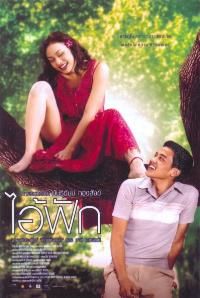
Abb.: Plakat
[Bildquelle: Wikipedia. -- Fair use]
|
"Ai-Fak (Thai: ไอ้ฟัก) is a 2004 Thai drama film. It is based on the S.E.A. Write Award-winning novel by Chart Korbjitti (ชาติ กอบจิตติ, 1954 - ), Khamphiphaksa (คำพิพากษา; 1981) (The Judgment, also the English-language title for the film). PlotA young man, Fak (ฟัก), is a revered novice Buddhist monk, and the entire village has turned out to the local temple to hear him preach a sermon. Fak's talk is interrupted a coughing fit by his widower father, though, and Fak struggles to maintain his focus. Fak then decides he must put aside his aspirations for monkhood to take care of his father. Then he is conscripted by lottery into the army. He hopes that when he completes his national service, he will return to the village, be ordained as a monk and devote his life to religion. On his return home from the army, the bus to his village breaks down. During the stop, Fak steps over to the side of the road, near a lotus pond, to urinate. There, among the lotus, he sees a beautiful woman bathing, fully clothed (as is customary in Thailand). Fak zips up and eventually arrives at home, where he finds his father in a very happy state. His father's reason for being so happy is that he has remarried. Fak's stepmother then appears from behind a mosquito net: it's the woman from the lotus pond. Her name is Somsong (สมทรง), and though she is sweet and devoted, there is something clearly wrong with her, perhaps some type of mental illness. Though there are happy times, with Fak joining his father at work as a janitor for the local school, his reunion with his father is short-lived after his father becomes ill and dies. Because Fak made a promise to his father that he would look after his stepmother, Fak's goal of returning to the monkhood must again be put aside. Though Fak is well liked in the village, the villagers do not like Somsong and have labeled her "crazy". And after Fak's father's death, the villagers start to treat Fak differently: they believe he is having an affair with his stepmother. Fak at first ignores the gossip, but it becomes harder and harder to deny because of Somsong's behavior. On one occasion, during a likay performance at a village fair, Fak is accosted by Somsong after she sees Fak talking with a young woman. Somsong is suffering from delusions that she and Fak are married, and she is jealous. Somsong also has the unfortunate habit of shedding her clothes and running naked in public, or simply lifting her dress and exposing herself. During one of these episodes, some villagers happen upon Fak just as he's chased the nude Somsong down and is attempting to cover her up. But what the villagers think they are witnessing is Fak having sex with his stepmother. Fak has been judged. Fak has taken his father's old job as school janitor. One day a dog that's thought to be rabid wanders on to the school grounds. Fak is given the job of killing it. He grabs a hoe and uses it to strike the animal, hitting it with a glancing blow that only injures it and makes it angrier. Fak eventually finishes the snarling dog off, but it is a bloody task. For a brief moment, Fak is seen as a hero by the students and faculty, and he feels a bit better about himself. Fak must prepare for his father's cremation. He invites the school's headmaster, the village headman and others. He orders 50 sandalwood blossoms for attendees to place on the burning casket. But no one shows up for the ceremony, except for the monks he engaged to chant over his father, and the local undertaker. Fak makes friends with the undertaker, a lowly person who is not well liked by the superstitious villagers because they believe he is unclean. Even Fak didn't particularly like the man, but after Fak tells him that he has never had sexual relations with Somsong, the man believes him. After the cremation rite, the undertaker offers Fak some rice whiskey. Fak at first doesn't like the taste or the way it makes him feel. But he has a few more drinks and starts enjoy himself. Looking for relief from the pressure of taking care of his mentally ill stepmother and the harsh judgment of the villagers, Fak turns to the bottle and becomes an alcoholic. His downward spiral continues until he has angered the villagers, and they turn on him and beat him, leaving him to be assisted home by Somsong. Cast
[Quelle: http://en.wikipedia.org/wiki/Ai-Fak. -- Zugriff am 2013-03-21] |
2004-03-29
Phaethongtan Shinawatra (แพทองธาร ชินวัตร, 1986 - ), die Tochter Ministerpräsident Thaksins, jobbt bei McDonald's für 23,75 Baht Stundenlohn, um die Arbeitswelt und Zusammenarbeit kennenzulernen.
2004-04-01
Einführung der elektronischen Identitätskarte. Sie enthält u. a. auch den Fingerabdruck, Religion, Blutgruppe, Name der Eltern, Name des Ehepartners. Die National Human Rights Commission bemängelt, dass die Karte eine Verletzung der Privatsphäre
2004-04-01
Premiere des Films Garuda (ปักษาวายฺ)
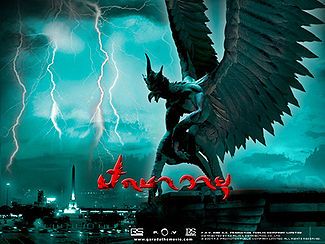
Abb.: Plakat
[Bildquelle: Wikipedia. -- Fair use]
|
Garuda (Thai: ปักษาวายฺ) ist ein thailändischer Action- und Horror-SciFi des Unternehmens R.S. Film und ist der erste Kinofilm des Unternehmens. Auf dem Filmfest Bangkoks erhielt R.S. Film einen Award für diesen Film. In der weiblichen Hauptrolle agiert das deutsch-thailändische Model Sara Legge (ซาร่า เล็กจ์, 1984 - ), die zu Drehbeginn weder eine Schauspielausbildung noch Erfahrungen im Spielfilmbereich besaß. [...] Handlung
In grauer Vorzeit herrschten beflügelte, als Einzelgänger lebende Kreaturen über den asiatischen Kontinent. In jener Zeit wurde auch ein mächtiger Mutant namens Garuda geboren, der stärker und kräftiger war als alle anderen Lebewesen. Gegen Ende der sogenannten „Goldenen Zeit“ tötete das Wesen seine Gefährten und verspeiste sie, woraufhin er von einigen Artgenossen gefangen und verbannt wurde. An der pakistanischen Grenze des Jahres 1977 macht der französische Archäologe Dr. Jeanvier einen erstaunlichen Fund. In einer Höhle entdeckt er Hinweise für die Existenz eines prähistorischen Flugwesens. Noch bevor er jedoch die Ausgrabungsstelle näher untersuchen kann, wird diese von der pakistanischen Luftwaffe bombardiert und zerstört. Der Wissenschaftler rettet sich in höchster Not mit einer versteinerten Kralle in die Freiheit.
2005 ist der öffentliche Nahverkehr in Bangkok weit mehr gefragt als früher. Bangkok Metropolis (กรุงเทพมหานครและปริมณฑล) beschließt daraufhin den Ausbau seines U-Bahn-Netzes und plant vor allem die umliegenden Vorstädte sowie Ortschaften mit dem U-Bahn-Netz erreichbar zu machen. Doch bei einem Tunnelbau in 80 m Tiefe kommt es zu einem Desaster, als der Bautrupp unerwartet auf Überreste einer mystischen Kreatur stößt, welche seit tausenden von Jahren ungestört unter der Erde verharrte. Unterdessen bittet die attraktive
Archäologin Leena, Tochter Dr. Jeanviers, die thailändische Regierung um
eine Genehmigung für archäologische Grabungen, mit dem Ziel, die Theorie
ihres inzwischen verstorbenen Vaters zu manifestieren. Ihr Wunsch,
Überreste einer mysteriösen Spezies von Vogelmenschen zu suchen, wird
aufgrund ihrer ethnischen Herkunft – Leena ist lediglich
Halb-Thailänderin – abgewiesen. Die verschmähte Hauptdarstellerin ist
tief enttäuscht. Während die Soldaten letzte Vorbereitungen treffen, das in einer eigenartigen Starre befindliche Ungetüm zu eliminieren, wird Garuda unsanft durch einen Energiestoß erweckt. Im weitläufigen Tunnelsystem eröffnet das flugfähige Monstrum eine nahezu lautlose und tödliche Jagd. Einheiten eines Spezialkommandos unter Führung von Tan Toschai wehren sich unter großen Verlusten gegen das „göttliche“ Ungetüm. Doch die Bemühungen des Militärs, Garuda am Entkommen zu hindern, schlagen fehl. Kommandant Toschai bildet mit den beiden Zivilisten, Leena und Tim, eine Zweckgemeinschaft und flieht an die Oberfläche. Garuda folgt ihnen, da Leenas Glücksbringer, eine versteinerte Kralle, bei ihm Begehrlichkeiten weckt. Bangkok befindet sich nun in Angst und Schrecken. Am Ende lockt Leena – zeitlich versetzt wurde Tim getötet – das Ungetüm mit ihrem Fossil auf das Dach eines Wolkenkratzers. Dort kommt es zum Showdown. Tan verletzt Garuda inmitten von erbittert geführten Kampfhandlungen schwer; das Wesen ist fortan flugunfähig. Mit einer List gelingt es Leena und Tan, Garuda in die Tiefe stürzen zu lassen. Kritiken
[Quelle: http://de.wikipedia.org/wiki/Garuda_%28Film%29. -- Zugriff am 2013-04-20] |
2004-04-05
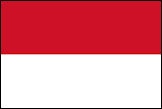
Parlamentswahlen in Indonesien. Mit 26,6% der Stimmen ist die Golkar-Party (Partai Golongan Karya / Sekber Golkar) die stärkste Partei.
Abb.: ®Logo der Golkar-Party
[Bildquelle: Wikipedia]
Abb.: Indonesien
[Bildquelle: CIA. -- Public domain]
2004-04-12
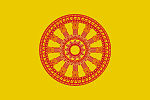
Offizielles Ende der Sammlung von Geld für den Staat ("Help the Nation") durch Ajahn Maha Bua (พระอาจารย์ มหาบัว, 1913 - 2011).
Ausschnitte aus einem Film über Ajahn Maha Bua (พระอาจารย์ มหาบัว) und "Help the Nation" (in Thai):
[Quelle der .mp4-Filmausschnitte: http://www.archive.org/details/BiographyOfLuangtaMahaBoowa--aBuddhistMasterWhoWasLikeTheSun (dort der ungekürzte Film). -- Zugriff am 2012-03-13. -- Public domain]
"Luangta Mahā Bua Nyānasampanno (Thai: หลวงตา มหาบัว ญาณสัมปันโน – Aussprache: lŭaŋ-tʰaː má-hăːbua jana-săm-pan-noː;) (* 12. August 1913 in Ban Taad (บ้านตาด), Thailand; † 30. Januar 2011, eigentlich Phra Thamma Visuthimongkon – พระธรรมวิสุทธิมงคล) war ein in Thailand hochverehrter buddhistischer Mönch und Abt des Klosters Wat Pa Ban Tat. Er wurde auch respektvoll Ajahn Mahā Bua (andere Schreibweise: Acariya Mahā Boowa) genannt, das bedeutet wortwörtlich übersetzt: Ehrwürdiger Lehrer Großer Lotus. Leben
Er wurde als Kind der Familie Lohitdee in einem Dorf im Landkreis Ban Taad (บ้านตาด), welches in der Provinz Udon Thani (อุดรธานี) im Nordosten von Thailand liegt, geboren. Er war eines von 17 Kindern einer Familie von Reisbauern. Als Kind beendete er die Schule nach der dritten Klasse, was zu seiner Zeit dem höchsten Bildungsstand entsprach, den man im Dorf erreichen konnte.
Am 12. Mai 1934 wurde er im Wat Yothanimit in der Provinz Udon Thani zum theravada-buddhistischen Mönch ordiniert. Sein Lehrmeister, der Ehrwürdige Chao Khun Dhammachedi, gab ihm den aus dem Pali stammenden Ordensnamen Ñanasampanno, was so viel bedeutet wie „einer der Weisheit besitzt“.
In den folgenden Jahren studierte er die Pali-Sprache sowie den buddhistischen Kanon. Nach einer siebenjährigen Studienzeit bestand er die Prüfungen zum dritten Grad der Pali-Studien und zum höchsten Grad der Studiengänge über den Dhamma und die Vinaya. Sein Pali-Abschluss berechtigte ihn, den Titel Mahā zu tragen.
Nun konnte er sich ganz dem kargen Leben eines Dhutanga-Mönches (ธุดงค์ - Wander-/Wald-Mönch) gemäß der thailändischen Waldtradition widmen. Da die Meditationsübungen auf seinen Wanderungen zunächst erfolglos waren, beschloss er, sich auf die Suche nach Ajahn Man Bhuridatta (หลวงปู่มั่น ภูริทัตโต, 1870 - 1949) zu machen, einem der bekanntesten Mönche und Meditations-Lehrer zu dieser Zeit. Er traf ihn schließlich 1942 in Nordost-Thailand und konnte ihn davon überzeugen, sein Lehrer zu werden. Unter der Anleitung von Ajahn Man lebte er bis zu dessen Tod im Jahr 1949.
Ajahn Mahā Bua wurde nun bald eine der zentralen Personen einer Gruppe von Mönchen, die die zu jener Zeit fast in Vergessenheit geratene Kammaṭṭhāna-Dhutanga-Tradition fortführten und damit die einzigartige Praxis von Ajahn Man für zukünftige Generationen bewahren wollten. Im Zuge dieser Bestrebungen gab er 1971 die Biographie von Ajahn Man heraus.
In den 1960er Jahren veranlasste die einsetzende Modernisierung und die damit einhergehende Abholzung der thailändischen Wälder die Dhutanga-Mönche, sich umzuorientieren. Sie mussten lernen, ihre Wanderungen einzuschränken oder sogar ganz aufzugeben. Manche Lehrer, so auch Ajahn Mahā Bua, entschieden sich dafür, beständige monastische Gemeinschaften einzurichten, wo Waldmönchen eine geeignete Umgebung geboten wurde, in der sie ihre schwer erworbenen Tugenden, wie Entsagung, strikte Disziplin und intensive Meditation im Sinne von Ajahn Man weiterleben konnten. So entstanden die so genannten „Waldkloster“ (Thai: วัดป่า – Wat Pa), die von praktizierenden Mönchen großen Zulauf erhielten und sich so zu großen Zentren buddhistischer Praxis entwickelten.
Abb.: Lage von Wat Pa Ban Tat (วัดป่าบ้านตาด)
[Bildquelle: OpenStreetMap. -- Creative Commons Lizenz (Namensnennung, share alike)]Ajahn Mahā Buas Waldkloster Wat Pa Ban Tat (วัดป่าบ้านตาด) in Udon Thani wurde von den Mönch-Studenten selbst gegründet, die hier aus rein spirituellen Gründen zusammenkamen, um Instruktionen von einem authentischen Meister zu erhalten. Sogar Mönche aus westlichen Ländern ließen sich später hier ordinieren; einige leben hier noch immer, andere gründeten im westlichen Ausland ähnliche Klöster. Der in England gebürtige ehemalige Vize-Abt Ajahn Pannavaddho starb im August 2004.
Mahā Bua verstarb am 30. Januar 2011 im Alter von 97 Jahren."
[Quelle: http://de.wikipedia.org/wiki/Ajahn_Maha_Bua_Nyanasampanno. -- Zugriff am 2012-03-13]
2004-04-13
Erste Probefahrt des Mass Rapid Transit (Bangkok Metro, รถไฟฟ้ามหานคร) von Hua Lamphong (HUA, สถานีหัวลำโพง) nach Bang Sue (BAN, สถานีบางซื่อ).
Abb.: Bangkok Metro (รถไฟฟ้ามหานคร)
[Bildquelle: Hdamm / Wikipedia. -- Creative Commons Lizenz (Namensnennung, share alike)]
2004-04-15
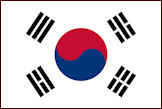
Parlamentswahlen in Südkorea. Die Yeollin Uri Party (열린우리당) gewinnt mit 152 Sitzen die absolute Mehrheit in der Nationalversammlung.
Abb.: ®Logo der Yeollin Uri Party (열린우리당)
[Bildquelle: Wikipedia]
Abb.: Lage von Südkorea
[Bildquelle: OpenStreetMap. -- Creative Commons Lizenz (Namensnennung, share alike)]
2004-04-16

Das Erste Deutsche Fernsehen (ARD) sendet in der Fernsehserie Das Traumhotel als erstes den Spielfilm (2004): Das Traumhotel - Sterne über Thailand. Traumhotels sind: J.W. Marriott Phuket und Mandarin Oriental.
Abb.: DVD-Cover
[Bildquelle: http://www.filminfos.de/drama/das-traumhotel-sterne-ueber-thailand--42979/. -- Zugriff am 2014-09-22. -- "DVD Cover und die Inhaltsbeschreibungen von filminfos.de dürfen auf fremden Websites frei verwendet werden, soweit: a) bei jeder Verwendung ein Quellen Hinweis angebracht wird, mit Verlinkung auf filminfos.de. Dieser Quellen Hinweis muss je Datensatz (DVD Cover, Inhaltsbeschreibung) erfolgen."]
2005-04-21 - 23

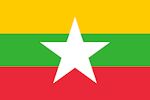
Gemeinsame Telgramme der US-Botschaften in Bangkok und Rangoon (Myanmar) an das US-Außenministerium:
Abb.: Lage von Ranong [ระนอง] and Kawthaung (ကော့ သောင်း မြို့ / เกาะ สอง]
[Bildquelle: OpenStreetMap. -- Creative Commons Lizenz (Namensnennung, share alike)]
Abb.: Lage von Ranong [ระนอง] and Kawthaung [ကော့ သောင်း မြို့ / เกาะ สอง]
[Bildquelle: OpenStreetMap. -- Creative Commons Lizenz (Namensnennung, share alike)]
"Classified By: DCM Ron McMullen for Reasons 1.4 (B,D) 1. (C) Summary: A recent joint visit by Bangkok and Rangoon Econoffs to Ranong [ระนอง] and Kawthaung [ကော့ သောင်း မြို့ / เกาะ สอง], along the southern Burmese-Thai border, shows business as usual in the informal movement of goods and people. However, the formal economy on both sides is sluggish due to the continued ban on Thai fishing in Burmese waters and the Burmese government's perpetually capricious economic policies. For Kawthaung (Burma), economic activity from the southern border trade continues to provide critically needed goods, and the border crossing remains an important outlet for workers from the interior seeking better economic opportunities in Thailand and Malaysia. In Ranong (Thailand), locals are giving up on Burma and looking regionally for their economic future. End summary.
Waiting for Fish: Ranong [ระนอง]
2. (U) To assess the current environment along the Thai-Burma border, Bangkok and Rangoon Econoffs traveled March 15-19 to two major border trade points -- Ranong (Thailand) and Kawthaung (Burma) and Mae Sot [แม่สอด] (Thailand) and Myawaddy [မြဝတီမြို့] (Burma; septel). Separated by a wide river mouth on the Andaman Sea [မုတ္တမ / ทะเลอันดามัน], Ranong and Kawthaung are tied together by the fishing industry and modest amounts of legal and illegal trade. According to Ranong Fisheries Association sources, more than 2,000 fishing boats (of various sizes) call Ranong home despite the fact that rich Burmese territorial waters have been off-limits to Thais for several years. Local businesspeople still blame the previous Thai Prime Minister Chuan Leekpai [ชวน หลีกภัย, 1938 - ] whose tough Burma policy led to the Burmese regime's cut off of Thai access to Burmese waters. Other Thai fishing industry sources blame overzealous Thai fishermen for decimating Burmese fish stocks in the 1990s, which led to a permanent Burmese crackdown.
3. (SBU) Whatever the reason, the fishing ban is slowly strangling Ranong's once vibrant commercial fishing and processing industry. Local Thai waters are not as rich, and severe responses by the Burmese Navy to poaching -- 40 Thai boats were seized in 2003 -- discourage poaching in Burmese waters. While a few fish processing plants remain, they buy much of their raw materials from Songkhla and other fishing grounds to the south to supply the domestic market.
4. (C) Border trade between the two countries is steady, but stifling GOB [Government of Burma] import controls and foreign exchange laws prevent it from booming. This environment keeps traders on their toes and requires creativity in sourcing and methods. The local Thai Customs chief noted that when the Burmese regime closed the border for trade in May 2002, Chinese products replaced Thai goods in Kawthaung's markets. Ranong Chamber of Commerce officials told us they would never invest in Burma because of its unstable business environment, and that trade is only possible on a small scale between "friends." A Burmese border trader agreed, saying only a small group Burmese businessmen in Kawthaung can thrive on trading with Ranong, using small boats to import consumer goods and diesel fuel -- usually illegally -- and export foodstuffs.
5. (SBU) Ranong's business community, and local RTG [Royal Thai Government] officials, say the future of Ranong is as much or more regional than bilateral. There is a vision of a major 20,000 ton-per-year port at Ranong that would serve as Bangkok's access to the Andaman Sea and points west. There is also hope that the touristic development of Burma's untouched Myeik Archipelago [မြိတ်ကျွန်းစု] (800 islands lying offshore of Kawthaung and north) will be a boon for Ranong's hotels, boat operators, and tour guides.
Tourism and Palm Oil: Kawthaung [ကော့ သောင်း မြို့ / เกาะ สอง]
6. (C) In Kawthaung, Burma's southernmost point, local businesspeople are rather pessimistic about the town's economic future. Its proximity to Thailand and Malaysia, and the number of small craft that ply the coastal waterways, will always ensure its role as a border trading and smuggling center and a mustering area for illegal migration to Thailand and Malaysia. However, Kawthaung's lack of infrastructure and neglect by the GOB will likely retard any major development (such as tourism or fisheries).
7. (C) A major GOB campaign underway north of Kawthaung is the development of large import-substituting palm oil and rubber plantations. Small businesspeople with whom we spoke supported the program, wherein the GOB will give low-interest loans and other assistance to set up these farms. However, this will be a crony-dominated program though larger, more savvy entrepreneurs admitted they were dubious that the government would ultimately prove a reliable consumer, at a fair price, of the end product.
Comment: Diverging Priorities
8. (C) Action along the Ranong-Kawthaung border, while relatively sleepy, illustrates several national trends. Particularly we saw in action the chilling effect on legal commerce of the Burmese regime's capricious and often punitive policies. Fortunately for local businesspeople, their close historical personal ties allow a continuation of trade on the informal level. However, this is no way to sustainably expand cross border economic ties. Sadly the Burmese business community is helpless to improve its lot. However local Thai entrepreneurs can and are moving on, looking elsewhere for their economic future. End comment.
9. (U) This is a joint Embassy Rangoon-Embassy Bangkok cable.
Martinez "
[Quelle: https://wikileaks.org/plusd/cables/04RANGOON488_a.html. -- Zugriff am 2015-04-05]
Abb.: Lage von Mae Sot [แม่สอด] and Myawaddy [မြဝတီမြို့]
[Bildquelle: OpenStreetMap. -- Creative Commons Lizenz (Namensnennung, share alike)]
"Classified By: DCM Ron McMullen for Reasons 1.4 (B,D) 1. (C) Summary: A recent visit by Bangkok and Rangoon [ရန်ကုန်] Econoffs to Mae Sot [แม่สอด] and Myawaddy [မြဝတီမြို့], the largest trading point on the Burmese-Thai border, shows trade volumes that are flourishing despite U.S. sanctions and increasingly ludicrous Burmese trade policy. Even more than it does the sleepy Kawthaung-Ranong border (ref A), Rangoon relies on Mae Sot as a source of daily consumer items as well as more crucial industrial inputs -- like diesel. Coming the other way, more than 2500-4000 Burmese a day cross legally into Thailand at this border point, with many more crossing illegally across the trickle of a river that demarcates the border. Some come as day laborers, others looking for more permanent illegal work. Though the business environment is tough, both Mae Sot and Myawaddy businesspeople look forward to a long and profitable relationship between the two sides -- whatever it takes. End Summary.
Crossing By Land
2. (U) To assess the current environment along the Thai-Burma border, Bangkok and Rangoon Econoffs traveled to two of the three major border trade points. The first of these was discussed in ref A (septel will look at broader border issues). The second -- Mae Sot, Thailand and Myawaddy, Burma -- is 140 miles east of Rangoon and 240 miles northwest of Bangkok and is separated only by a trickle of a river. This crossing, the largest by trade volume of the three, has a long history of legal and illegal commerce. The third crossing is in northern Thailand at Mae Sai [แม่สาย] and Tachileik [တာချီလိတ်] (in Burma's Shan State).
Abb.: Lage von Mae Sai [แม่สาย] und Tachileik [တာချီလိတ်]
[Bildquelle: OpenStreetMap. -- Creative Commons Lizenz (Namensnennung, share alike)]3. (U) Mae Sot-Myawaddy, joined seven years ago by the "Friendship Bridge," [สะพานมิตรภาพ ไทย-พม่า] is a classic land border crossing with trucks stuffed with consumer goods rumbling into Burma's still somewhat unstable Karen State [ကရင်ပြည်နယ်], toward the Andaman Sea [မုတ္တမ] coast or Rangoon. Coming in the other direction are some Burmese agricultural products and raw materials and about 2,500-4,000 Burmese workers -- mostly ethnic Karen [ကညီကလုာ်], Mon [မောန်], and Burman -- per day. Many more Burmese likely cross illegally into Thailand near Mae Sot across the Moei River [แม่น้ำเมย].
Trucking to Rangoon: Mae Sot and Myawaddy
4. (U) Unlike the somewhat shaky state of the Kawthaung-Ranong dynamic, the Mae Sot and Myawaddy economic relationship is extremely vigorous and hugely in Thailand's favor. The road west from Myawaddy to Rangoon is still poor, running one way on alternating days, and passing through regions still controlled by insurgent groups. It is nonetheless the closest border crossing to Rangoon and is thus a magnet for exports to Burma -- often illegal -- from Mae Sot, elsewhere in Thailand, and from third countries via Bangkok. The Mae Sot Chamber of Commerce estimated that only 30 percent of goods that cross into Burma at Mae Sot originate locally in Tak Province [ตาก]. These goods are trucked to Mae Sot, over the bridge (or across the shallow Moei River) into Myawaddy, and then hauled on Burmese vehicles onward to Moulmein [မော်လမြိုင်မြို့] or Thaton [သထုံမြို့] on the Andaman coast or to Rangoon.
5. (C) According to Thai Customs and Mae Sot Chamber of Commerce numbers, the total trade volume is now about 800 million baht (USD 20 million) per month with 95 percent of that Thai exports. Official statistics show the trade made up of Thai consumer products, vegetable oil, MSG [Monosodium glutamate], plastic pellets, textiles, construction inputs, and diesel fuel trading for Burmese frozen and dried seafood, livestock, peanuts, bamboo, non-teak wooden furniture, and fish maw. Burmese legal exports were cut in half in 2003 when the RTG [Royal Thai Government] banned the import of teak furniture and teak logs without a GOB [Government of Burma] certificate of origin. Thai businesspeople had been secretly sending Thai teak, the cutting of which is currently SIPDIS banned, to Burma to be re-imported as "Burmese" furniture or logs.
6. (C) Smuggling is a major component of the Mae Sot-Myawaddy trade. Because the GOB [Government of Burma] bans most of what Thailand exports to Burma (especially consumer goods), only 10 percent of the Thai exports, mostly construction inputs, enter Burma at the GOB Customs checkpoint on the Friendship Bridge. The remaining 90 percent is checked out of Thailand legally at one of the 16 RTG Customs docks stretching 5 km along the Moei River, and then smuggled into Burma on the other side. Smuggling is not as active coming from Burma, though Thai businesspeople estimate that contraband teak products and gems add another 10-20 percent per month to the Thai import numbers. Thai Customs told us that there are also periodic seizures of amphetamines -- including a shipment in October 2003 of 9.4 million pills. Strangely, Myawaddy businesspeople complained it was necessary to smuggle Thai cement into the border areas, as RTG authorities purportedly ban this border trade to avoid giving the GOB material to build bunkers.
7. (C) Another boon to Mae Sot and Myawaddy border traders is the weaker GOB hand in Karen State. Though the Friendship Bridge is controlled by the Burmese army and "NaSaKa" inter-agency border force, the smaller riverine border trade crossings and the transportation network once inside Burma have been left in the hands of the ethnic Karen armed groups -- especially the pro-Rangoon Democratic Karen Buddhist Army [ဒီမိုကရက်တစ် တိုးတက်သော ဗုဒ္ဓဘာသာ ကရင်တပ်မတော်] (DKBA). Though there are countless DKBA and anti-Rangoon Karen National Union [ကရင်အမျိုးသားအစည်းအရုံး] (KNU) checkpoints on the Myawaddy-Rangoon road, Thai exporters and Burmese importers alike say they are content with the arrangement as a single payment to an ethnic broker in Myawaddy is usually adequate to ensure a safe journey. Contrast this to trade routes firmly in the GOB's [Government of Burma] hands such as Kawthaung where, Burmese importers complain, multiple payments are required though they do not guarantee hassle-free passage. Thai exporters were unanimous, though, that business would be even better if there were a cease-fire agreement completed between the SPDC [State Peace and Development Council - နိုင်ငံတော် အေးချမ်းသာယာရေး နှင့် ဖွံ့ဖြိုးရေး ကောင်] and the KNU.
Comment:
8. (C) The relentless movement of goods from Mae Sot to Myawaddy is one of the major sources of lifeblood for Burma's troubled economy and government (ref C). Though the trade flows we examined are solidly in Thailand's favor, the products sold are generally not unique and are easily replaced -- even in Myawaddy's marketplaces -- by Chinese goods. Thailand's border entrepreneurs often look westward for natural resources off limits or not available domestically or from other bordering states. Thus, a Thai-Burma border closing, as occurred in 2002, would hurt the Mae Sot Thai exporting community as much or more than the Burmese. End comment
9. (U) This is a joint Embassy Rangoon-Embassy Bangkok cable.
Martinez "
[Quelle: https://wikileaks.org/plusd/cables/04RANGOON497_a.html. -- Zugriff am 2015-04-05]
"Classified By: COM CARMEN MARTINEZ FOR REASONS 1.4 (B,D) 1. (C) Summary: Despite predictions that new U.S. sanctions would cause major changes in border trade and migration, a recent visit by Bangkok and Rangoon Econoffs to two of the three major Thai-Burma border crossings (refs A and B) shows business as usual in the movement of goods and people. Though border trade has not spiked since the sanctions came into effect, it continues to grow because of the generally informal nature of the border trade. The flow of economic migrants to Thailand has also not risen dramatically since the new sanctions took effect, but thousands of Burmese continue to flock across the border in search of better economic opportunity. The Thai government has started some assistance programs aimed at developing Burma's border area economy. However, local businesspeople on both sides are skeptical that such an approach will have much impact. End summary.
Border Trade Booms Despite Sanctions
2. (C) Despite expectations of sharp spikes in border trade and economic migration due to new U.S. sanctions (which took effect in July 2003), on the Thai-Burmese border at Ranong (Thailand)-Kawthaung (Burma; ref B) and Mae Sot (Thailand)-Myawaddy (Burma; ref A) businesspeople said they'd seen few notable changes. Since July 2003, the volume of trade has continued to rise in both areas, though there has been no unusual jump in volume either legal or illegal. Thai traders in Mae Sot said they have noticed a more lax attitude at Burmese Customs to the free flow of goods in the last year. However, a Burmese trader in Kawthaung said that, to the contrary, import licenses for border trade have become dearer since Rangoon re-asserted control over issuance -- a right previously devolved to local GOB Border Trade Department officials.
3. (C) Border trade trends are independent from those of non-border commerce (which has fallen dramatically since last summer) because of the informal nature of border trade, even if done legally. Businesspeople contract almost exclusively with friends, and payments are nearly always routed via an unofficial, and illegal in Burma, hundi system. (The hundi system is an unofficial network that is used worldwide to send remittances and provide trade settlement across borders.) For legal border trade imports into Burma, underinvoicing is the rule, with hundi payments used make up the difference. Thai-Burma border traders are further insulated from the impact of the 2003 sanctions because they rarely use USD for their transactions, instead dealing in Burmese kyat [ကျပ်] or Thai baht.
4. (C) Thai businesspeople on the border were universally negative about the U.S. sanctions. Though they are unlikely democracy boosters and are no champions of the Burmese everyman, some pled the case of the "poor Burmese" suffering under sanctions-induced economic problems, making it impossible for them to "think of democracy." Others were more parochial, saying sanctions induced increased illegal immigration which burdened Thailand. Most supported PM Thaksin's [ทักษิณ ชินวัตร, 1949 - ] decision to engage with the SPDC, saying the previous PM's support for U.S. policy on Burma had led to a GOB crackdown on Thai trade and businesspeople in general.
5. (C) However, Thai and Burmese businessmen did not blame sanctions for the poor economic climate in Burma and the need for smuggling. Instead they pointed to the mercurial trade policy of the GOB. All agreed that nearly all products could be traded legally or illegally depending on the current GOB restrictions.
Economic Migrants: An Unstoppable Flow
6. (C) It is clear that Burma's major export to Thailand at both border points is people. An international NGO in Ranong (Thailand) told us as much as 40 percent of the city's 250,000 population is Burmese, the vast majority working in fish processing factories and in construction. Many more cross over and move further inland into Thailand seeking a better economic situation elsewhere. Likewise in Mae Sot, the population of Burmese migrants is very high, with 2,500-4,000 crossing into Thailand every day. Many return to Myawaddy at night, but many others stay to work in shops, in the agricultural sector, or in the foreign-owned garment factories of Mae Sot.
7. (C) Labor organizers in Mae Sot report that these migrants, even those few who register with the Thai labor authorities, face harsh working conditions and wages about 50 percent of the Thai minimum wage (about USD 3.50/day). However, even this small sum is probably 100-250 percent what they would make as laborers in Burma so the inflow of Burmese workers is relentless.
8. (C) Local representatives of World Vision, a USG partner in anti-trafficking and HIV/AIDS efforts in the region, report that while trafficking of Burmese women into Ranong is rare, Mae Sot does serve as a portal for trafficked persons and economic migrants to other destinations in Thailand. One estimate from Ranong was that only 10 percent of migrants there were "trafficked," and few illegal Burmese in town were working as prostitutes. Mae Sot has a more organized labor export business from Burma -- involving the private sector and authorities on both sides of the border -- which charged would-be migrants USD 175 a head to cross through the jungle and USD 375 a head to be smuggled in by truck.
9. (C) Thai NGOs and local factory owners told us that there had not been a large increase in migrants since the new sanctions, which also banned imports of Burmese products, took hold last July. However, the steady inflow of workers was certainly higher than the demand for cheap labor on the Thai side in both Ranong and Mae Sot. One labor NGO leader in Mae Sot said that he had seen an increase in female job seekers from Rangoon and Mandalay since the sanctions, alongside the normal crowd from Karen and Mon States.
Thailand's ECS Plan Has Little Impact at Border
10. (SBU) Since the initiation of the Economic Cooperation Strategy (ECS) [Ayeyawady-Chao Phraya-Mekong Economic Cooperation Strategy] program in 2003 (ref E), the RTG has worked to spur bilateral trade and provide technical training and development aid to Burma. The Thai Finance Ministry is currently considering eliminating import tariff rates on 751 products from Burma under the ASEAN Integrated System of Preferences (AISP). According to Thai Ministry of Commerce (MoC) officials, the RTG will soon allow duty free entry of eight agricultural products -- maize, sweet corn, soybeans, potatoes, eucalyptus, sesame seeds, and cashew nuts -- from Burma, Laos, and Cambodia. Under the ECS program, Thailand, a net importer of soybeans, plans to provide technical training to Burmese farmers to help improve quality; in Mae Sot, local businessmen opined that at some point in the future, contract farming might be a viable investment, boosting agricultural trade. In addition, the RTG has vowed to build a road from Myawaddy to the base of the Karen hills 18 km from the border as part of a larger effort to create a road link across central Burma, from Thailand to India. According to a Thai MFA source, this project is "well under way," with funding from the Asian Development Bank.
11. (SBU) Businessmen in Ranong, however, complained that the ECS program favors large Thai companies with close ties to leaders in Bangkok, and will likely have very little impact on the realities of cross border trade in the provinces. In any case, as both Thai MoC officials and local traders pointed out, the ECS program did little to improve the biggest hurdles in dealing with Burma -- the chronically uncertain investment climate. The constant threat of appropriation by the GOB leaves little incentive for Thai businessmen to seek local partnerships. A Thai MoC official noted that efforts to forge a bilateral investment and border trade agreement have been ongoing for almost ten years, with little success. Even if such an agreement were possible, she admitted, this document would still be "just paper."
Comment: Squeezing the Balloon
12. (C) The RTG's efforts to stimulate the border economy are logical considering the demand for some Burmese products and the desire to stem illegal migration. However, the success of this project, like so many other traditional efforts to develop Burma's rudimentary economy, will depend on the will of the Burmese regime to take advantage of the proffered assistance. For instance, the Burmese government is inexplicably banning the export of some of the products for which Thailand is thinking of allowing tariff-free access. Even if the ECS projects do not succeed in stimulating Burma's formal economy and legal trade, and U.S. sanctions continue, we are confident that the close personal links between businesspeople on both sides of the borders will ensure informal trade of goods continues to pick up a good deal of the slack. Likewise, until employment opportunities in Burma increase drastically, the allure of even Thailand's worst-paying jobs will be significant for hundreds of thousands of poor Burmese. End comment
13. (U) This is a joint Embassy Rangoon-Embassy Bangkok cable.
Martinez "
[Quelle: https://wikileaks.org/plusd/cables/04RANGOON513_a.html. -- Zugriff am 2015-04-05]
2005-04-22
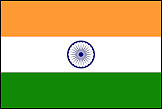
Manmohan Singh (ਮਨਮੋਹਨ ਸਿੰਘ, 1932 - ) wird Ministerpräsident Indiens.
Abb.: Manmohan Singh (ਮਨਮੋਹਨ ਸਿੰਘ)
[Bildquelle: DonkeyHotey. -- http://www.flickr.com/photos/donkeyhotey/5666078544/in/photostream. -- Zugriff am 2012-01-05. -- Creative Commons Lizenz (Namensnennung, share alike)]
Abb.: Manmohan Singh (ਮਨਮੋਹਨ ਸਿੰਘ) / von Murray Webb (1947 - ), 2008
[Bildquelle: Manmohan Singh. 3 November, 2008.. Webb, Murray, 1947- :[Digital caricatures published from 29 July 2005 onwards (2006, 2007, 2008). Includes a selection of digital caricatures published from 2002 and up to July 2005.]. Ref: DCDL-0007955. Alexander Turnbull Library, Wellington, New Zealand. http://natlib.govt.nz/records/23186344. -- Zugriff am 2013-03-07. -- "You can copy this item for personal use, share it, and post it on a blog or website. It cannot be used commercially without permission"]
2004-04-26
Nidhi Eowseewong (นิธิ เอียวศรีวงศ์. 1940 - ) sagt, dass die Bedrohung der Medienfreiheit durch die Regierung seit Oktober 1976 nicht mehr so schlimm war wie jetzt. Die Regierung hat
die TV-Show "Khor Kid Duay Khon" (ขอคิดด้วยคน,Thinking Like the People) verboten
beim Radioprogramm "Ruam Duay Chuay Kan" (ร่วมด้วยช่วยกัน, Helping Each Other) interveniert
inländische und ausländische Medien verwarnt
den Zeitungen Thai Post (ไทย โพสต) und Naew Na (แนวหน้า) Anzeigen entzogen
die Entlassung der Herausgeber von Bangkok Post und Siam Rath (สยามรัฐ) veranlasst
Abb.: Nidhi Eowseewong (นิธิ เอียวศรีวงศ์)
[Bildquelle: th.Wikipedia. -- Fair use]
"Nidhi Eoseewong (also rendered Nithi Aeusrivongse and Nithi ʻĪeosīwong) (Thai: นิธิ เอียวศรีวงศ์, b. May 8, 1940) is a prominent Thai historian, writer, and political commentator. Biography
Nidhi Eoseewong was born on May 8, 1940, to an ethnic Chinese family in Chiang Mai (เชียงใหม่), Thailand. He studied at Assumption College (โรงเรียนอัสสัมชัญ) Sriracha in Chon Buri (:), and went on to earn bachelor's and master's degrees in history from Chulalongkorn University (จุฬาลงกรณ์มหาวิทยาลัย) in Bangkok. Upon graduation, he accepted a position teaching history at Chiang Mai University (มหาวิทยาลัยเชียงใหม่), where he would go on to spend the majority of his professional career. He took temporary leave to continue his studies, completing a PhD from the University of Michigan in 1976. He retired in 2000, but has remained active in the academic community. He is an important contributor to the website Midnight University (มหาวิทยาลัยเที่ยงคืน), and continues to publish and make appearances regularly."
[Quelle: http://en.wikipedia.org/wiki/Nidhi_Eoseewong. -- Zugriff am 2012-01-02]
2004-04-28
Massaker durch Sicherheitskräfte in der Krue-Se-Moschee (Masjid Kerisek, มัสยิดกรือเซะ) in Pattani (ปัตตานี):170 Tote.
Abb.: Lage von Pattani (ปัตตานี)
[Bildquelle: OpenStreetMap. -- Creative Commons Lizenz (Namensnennung, share alike)]
Abb.: Krue-Se-Moschee (Masjid Kerisek, มัสยิดกรือเซะ), Pattani (ปัตตานี)
[Bildquelle: ©Google earth. -- Zugriff am 2012-01-02]
"On 28 April 2004, more than 100 militants carried out terrorist attacks against 10 police outposts across Pattani (ปัตตานี), Yala (ยะลา) and Songkhla (สงขลา) provinces in southern Thailand. 32 gunmen retreated to the 425-year-old Krue Se Mosque (Masjid Kerisek, มัสยิดกรือเซะ), regarded by Muslims as the holiest mosque in Pattani. General Pallop Pinmanee (พัลลภ ปิ่นมณี, 1936 - ), commander of the Southern Peace Enhancement Center and Deputy Director of the Internal Security Operations Command (ISOC, กองอำนวยการรักษาความมั่นคงภายใน - กอ.รมน.), was the senior Army officer on the scene. After a tense seven hour stand-off, Pallop ordered an all out assault on the mosque. All of the gunmen were killed. He later claimed, "I had no choice. I was afraid that as time passed the crowd would be sympathetic to the insurgents, to the point of trying to rescue them."
It was later revealed that Pallop's order to storm the mosque contravened a direct order by Defense Minister Chavalit Yongchaiyudh (ชวลิต ยงใจยุทธ, 1932 - ) to seek a peaceful resolution to the stand-off no matter how long it took. Pallop was immediately ordered out of the area, and later tendered his resignation as commander of the Southern Peace Enhancement Center. The forward command of the Internal Security Operations Command (ISOC), which Pallop headed, was also dissolved. A government investigative commission later found that the security forces had overreacted. The Asian Centre for Human Rights questioned the independence and impartiality of the investigative commission. On 3 May 2004 during a Senate hearing, Senator Kraisak Choonhavan (ไกรศักดิ์ ชุณหะวัณ, 1947 - ) noted that most of those killed at Krue Se Mosque were shot in the head and there were signs that rope had been tied around their wrists.
The incident resulted in a personal conflict between Pallop and Defense Minister Chavalit, who was also director of the ISOC. Pallop later demanded that the Defense Minister stop any involvement in the management of the southern insurgency."
[Quelle: http://en.wikipedia.org/wiki/South_Thailand_insurgency#Krue_Se_Mosque_Incident. -- Zugriff am 2012-01-02]
"Pallop Pinmanee (Thai: พัลลภ ปิ่นมณี, born 25 May 1936) is a retired Thai Army general who took part in several coups, ordered the massacre of insurgents at Krue Sae Mosque and allegedly played a role in the attempted car-bomb assassination of Prime Minister Thaksin Shinawatra. After a 2006 military coup overthrew Thaksin, the military junta appointed Pallop public relations adviser to the Internal Security Operations Command (ISOC / กองอำนวยการรักษาความมั่นคงภายในราชอาณาจักร) of Thailand. Military career
Pallop was a member of Class Seven of the Chulachomklao Royal Military Academy (โรงเรียนนายร้อยพระจุลจอมเกล้า), the "Young Turks", where he befriended classmate Chamlong Srimuang (จำลอง ศรีเมือง, 1935 - ).[1] He began his military career as a commando and self-professed assassin.[2] With his Young Turk classmates, Pallop was involved in successful military coups against the governments of Seni Pramoj (เสนีย์ ปราโมช, 1905 - 1997) and Tanin Kraivixien (ธานินทร์ กรัยวิเชียร , 1927 - ) and an unsuccessful April Fool's Day 1981 coup against the government of Prem Tinsulanonda (เปรม ติณสูลานนท์, 1920 - ).[citation needed] He also admitted masterminding a number of assassination attempts against General Arthit Kamlang-ek (อาทิตย์ กำลังเอก, 1925 - 2015), commander of the Army under Prem.[citation needed]
He participated in guerrilla-warfare missions in Laos in 1966 and 1967 and was appointed chief of the Special Thai Ranger Army, a volunteer unit which carried out clandestine, anti-communist guerrilla operations financed by the US Central Intelligence Agency against the North Vietnamese Army along the Ho Chi Minh Trail in Laos, in 1968.[2][3] Two years later, he was appointed leader of a secret seven-man unit which carried out extrajudicial killings. "The assignment was to kill the leaders of communist groups all over Thailand", he told a reporter, and claimed to have assassinated many suspected communists.[2]
Pallop was appointed a senator by the military-led government in 1979, and became commander of the 19th Infantry Regiment the following year. He participated in operations along the Thai-Cambodian border in 1986 and 1987.[4]
He was involved in several coups.[3] With other members of the Young Turks, he helped topple the elected government of Seni Pramoj after the massacre of 6 October 1976 (เหตุการณ์ 6 ตุลา). Pallop also participated in the 1977 coup against the ultra-conservative government of Tanin Kraivixien. During the Prem government, the Young Turks tried to seize power on 1 April 1981. When it became clear that the royal family continued to support Prem, the coup failed; although Pallop fled to the Lao PDR to escape punishment, he was jailed for two months by the Laotian government. He later admitted masterminding a number of assassination attempts against General Arthit Kamlang-ek, commander of the army in Prem's administration.[citation needed]
Although Pallop was rehabilitated and retired from the Royal Thai Army with the rank of general in 1996, he was appointed deputy director-general of the Internal Security Operations Command. In this position, he ordered military forces to storm the Krue Sae Mosque during a standoff with southern insurgents.[citation needed]
Krue Sae mosque incidentPallop was appointed commander of the Southern Peace Enhancement Center to deal with insurgency in southern Thailand. On 28 April 2004, more than 100 militants carried out attacks against 10 police stations across Pattani, Yala and Songkhla provinces in southern Thailand.[5] Thirty-two insurgents retreated to the Krue Sae Mosque, the main mosque in Pattani. A seven-hour standoff ended when Pallop, the senior army commander on the scene, ordered an assault on the mosque; all the insurgents were killed. He later said, "I had no choice. I was afraid that as time passed the crowd would become sympathetic to the insurgents, to the point of trying to rescue them."[6]
It was learned that Pallop's order to storm the mosque contravened an order by defense minister Chavalit Yongchaiyudh (ชวลิต ยงใจยุทธ, 1932 - ) to seek a peaceful resolution to the standoff, regardless of how long it took.[7] Pallop was immediately ordered out of the area, and later tendered his resignation as commander of the Southern Peace Enhancement Center. The forward command of the Internal Security Operations Command (ISOC), which Pallop headed, was also dissolved. Although a governmental investigative commission found that security forces had overreacted, the Asian Centre for Human Rights questioned the commission's independence and impartiality. During a 3 May 2004 Senate hearing, Senator Kraisak Choonhavan (ไกรศักดิ์ ชุณหะวัณ. 1947 - ) noted that most of those killed at Krue Se Mosque were shot in the head and had signs that rope had been tied around their wrists. The incident sparked conflict between Pallop and Defense Minister Chavalit (who was also director of the ISOC),[8] and Pallop later demanded that the defense minister end his involvement in managing the southern insurgency.[9]
Opposition to Thaksin ShinawatraPallop is critical of former prime minister Thaksin Shinawatra. During protests against Thaksin in early 2006, Pallop said: "As a real friend and former classmate from military school, I fully support Chamlong (Srimuang) in his move (to oust Thaksin)".[1] He also threatened Thaksin with a military coup if Thaksin did not resign from the premiership.[10]
Assassination plotPallop was dismissed from his ISOC deputy-director position after Thawatchai Klinchana, his driver, was found driving a car containing 4.5 kg of explosives near Thaksin's residence. According to Metropolitan Police Bureau commissioner Wiroj Jantharangsee, the explosives were assembled, equipped with a remote sensor and ready to be detonated.[11] Kamthorn Ooycharoen, head of the police bomb-disposal squad at the scene, confirmed that the bomb was ready for detonation.[12] It was composed of a remote control unit, M-8 military fuses,[citation needed] sticks of TNT, C-4 plastic explosives, and nine plastic containers containing ammonium nitrate fuel oil (ANFO).[3][12]
Pallop denied any involvement: "If had wanted to do it, I would have done it more subtly. In my career, I have led death squads. If I had wanted to kill him, the prime minister would not have escaped".[13][14][15] According to him, "The explosives were being transported; they were not assembled to be detonated."[16]
After the 2006 coupA military coup overthrew the Thaksin government on 19 September 2006, and the junta appointed Pallop public-relations adviser to the ISOC in May 2007. He promised to use "secret tricks" and negotiation, avoiding violent clashes: "Don't see me as a man who favours violence".[17]
During the political crisis which began in October 2013, Pallop told the media in late February 2014 that he had been asked by the caretaker government to join the Centre for Maintaining Peace and Order (CMPO).[18] According to an Australian academic, Pallop was recruited to advise on dealing with "men in black" gunmen at protests; the term originated during the 2010 crackdown on red-shirt supporters, when mysterious armed figures emerged.[19] Military sources have said that the "men in black" may be mercenaries.[20]
Personal lifePallop is married to Khunying Naruedee Pinmanee (คุณหญิง นฤดี ปิ่นมณี),[21] and has a son and two daughters.[citation needed]
[Quelle: https://en.wikipedia.org/wiki/Pallop_Pinmanee. -- Zugriff am 2016-11-14]
2004-05
Ein Händler aus Suphan Buri (สุพรรณบุรี) über Korruption (er nennt es Schmiermittel - น้ำมันหล่อลื่น) von Banharn Silpa-archa (บรรหาร ศิลปอาชา, 1932 - ):
Abb.: Lage der Provinz Suphan Buri (สุพรรณบุรี)
Bildquelle: [Bildquelle: CIA. -- Public domain]
"Just by offering a little money under the table to a few senior bureaucrats, Banharn can get their whole department or ministry to serve the needs of Suphan. If he doesn't pay them, he may still be able to get funds for us, but not much. But he knows that if he pays them a little money, he can get ten times more funds. That is what he has been doing to develop Suphan." [Quelle: Nishizaki, Yoshinori [訳吉武好孝, 西崎一郎]: Political authority and provincial identity in Thailand : the making of Banharn-buri. -- Ithaca, N.Y. : Cornell, 2011. -- 254 S. :Ill. ; 26 cm. -- (Studies on Southeast Asia ; 53). -- ISBN 978-0-8772-7753-8. -- S. 186]
2004-05-10

Gloria Macapagal-Arroyo (1947 - ) wird als Präsidentin der Philippinen wiedergewählt.
Abb.: Lage der Philippinen
[Bildquelle: OpenStreetMap. -- Creative Commons Lizenz (Namensnennung, share alike)]
Abb.: Gloria Macapagal-Arroyo, 2008
[Bildquelle: gmaresign. -- http://www.flickr.com/photos/gloriaresign/2326469242/. -- Zugriff am 2012-01-04. -- Creative Commons Lizenz (Namensnennung, keine kommerzielle Nutzung, share alike)]
2004-05-10
Time - Asian edition zitiert einen Militanten aus den muslimischen Südprovinzen:
"We cannot compromise. The Thai government is not interested in talking to us. The fight will go on. We want independence. Nothing less than that." [Zitiert in: Abuza, Zachary: Conspiracy of silence : the insurgency in southern Thailand. -- Washington, DC : United States Institute of Peace Press, 2009. -- 293 S. ; 23 cm. -- ISBN 9781601270023. -- S. 5f.]
2004-05-20

Das US-Repräsentantenhaus beschließt eine Erhöhung des Militärhaushalts für 2005 um 5,2% auf $422 Milliarden.
2004-05-22
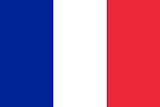
Der Film Sud Pralad (สัตว์ประหลาด, Tropical Malady) von Apichatpong "Joe" Weerasethakul (อภิชาติพงศ์ วีระเศรษฐกุล, 1970 - ) gewinnt beim Filmfestival in Cannes (Frankreich) den Jury Prize.
Abb.: Lage von Cannes (Frankreich)
[Bildquelle: OpenStreetMap. -- Creative Commons Lizenz (Namensnennung, share alike)]
Abb.: Plakat
[Bildquelle: Wikipedia. -- Fair use]
"Tropical Malady (Thai: สัตว์ประหลาด or Sud pralad; RTGS: Satpralat) is a 2004 Thai romantic psychological drama film directed by Apichatpong Weerasethakul (อภิชาติพงศ์ วีระเศรษฐกุล, 1970 - ). It is a film in two segments – the first part a romance story about two homosexual men, and the second a mysterious tale about a soldier lost in the woods, bedeviled by the spirit of a shaman. It won the Jury Prize at the 2004 Cannes Film Festival and was the first Thai film to be in the main competition at Cannes. It is also the first Thai film to win a prize at any of the "A festivals". Synopsis
Keng (played by Banlop Lomnoi - บรรลพ ล้อมน้อย), is a soldier assigned to a post in a small city in rural Thailand. The troops' main duties, it seems, is to investigate the mysterious slaying of cattle at local farms. While in the field one day, Keng meets Tong (played by Sakda Kaewbuadee - ศักดา แก้วบัวดี). Later, Keng sees Tong riding in a truck in town. The two men have made a connection and embark on a romance, taking trips in the countryside.
Then one night, the country boy wanders off into the dark. The film's narrative abruptly shifts to a different story, about a soldier (played by Lomnoi again) sent alone into the woods to find a lost villager. In the woods, the soldier encounters the spirit of a tiger shaman (played by Kaewbuadee again), who taunts and bedevils the soldier, causing him to run through the woods and become lost and isolated himself.
ReceptionAt the press screening at the 2004 Cannes Film Festival, several audience members left before the film was over and some of those who stayed until the end booed it. The film received generally poor reviews from such industry journals as Variety and Hollywood Reporter, but then won the Jury Prize from the jury headed by Quentin Tarantino and has been generally met with favorable reviews since then.
Also, it was ranked 49th on They Shoot Pictures, Don't They's list of the 250 best films of the 21st century and was rated the 3rd best film of 2005 by Slant Magazine's Ed Gonzalez
In Thailand, the film screened for just 10 days at the Siam Theatre (โรงภาพยนตร์สยาม).
Awards
- 2004 Cannes Film Festival - Jury Prize
- 2004 São Paulo International Film Festival - Critics Award
- 2005 Indianapolis International Film Festival - Special Jury Prize for Directing
It was ranked 49th on They Shoot Pictures, Don't They's list of the 250 best films of the 21st century and was rated the third best film of 2005 by Slant Magazine's Ed Gonzalez."
[Quelle: http://en.wikipedia.org/wiki/Sud_pralad. -- Zugriff am 2012-01-02]
2004-05-24
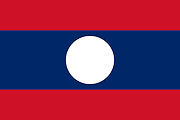
Die laotische Zeitung Vientiane Times über Besucher aus Nordostthailand in Laos:
"Isaan [อีสาน] turns its back on wetsrenised home." [Zitiert in: Tappe, Oliver: Geschichte, Nationsbildung und Legitimationspolitik in Laos : Untersuchungen zur laotischen nationalen Historiographie und Ikonographie. -- Berlin : Lit, 2008. -- 393 S. : Ill. ; 24 cm. -- (Comparative anthropological studies in society, cosmology and politics ; vol. 4.). -- ISBN 978-3-8258-1610-0. -- Zugl. Münster, Univ., Diss. 2007. -- S. 321]
2004-05-31

Die laotische Zeitung Vientiane Times über Besucher aus Nordostthailand im Vat Sisaket (ວັດສີສະເກດ) in Vientiane (ວຽງຈັນ)
"Isaan [อีสาน] people miss their culture." [Zitiert in: Tappe, Oliver: Geschichte, Nationsbildung und Legitimationspolitik in Laos : Untersuchungen zur laotischen nationalen Historiographie und Ikonographie. -- Berlin : Lit, 2008. -- 393 S. : Ill. ; 24 cm. -- (Comparative anthropological studies in society, cosmology and politics ; vol. 4.). -- ISBN 978-3-8258-1610-0. -- Zugl. Münster, Univ., Diss. 2007. -- S. 269]
Abb.: Vat Sisaket (ວັດສີສະເກດ)
[Bildquelle: Bluesparkle / Wikimedia. -- Creative Commons Lizenz (Namensnennung)]
2004-06
Es erscheint:
Thailand : not enough graves : The war on drugs, HIV/AIDS, and violations of human rights. -- In: Human Rights Watch. -- 16, No. 8 (C) (2004-06). -- Online: http://pantheon.hrw.org/reports/2004/thailand0704/thailand0704.pdf. -- Zugriff am 2016-04-20
"Summary Why do you have to kill people? . . . It’s better to help drug users find ways to change their behavior instead of killing them. There are not enough graves to bury us all.
—Odd Thanunchai, twenty-six, a recovering heroin user in Chiang Mai [เชียงใหม่]A violent state-sponsored “war on drugs” is jeopardizing Thailand's long struggle to become one of Southeast Asia's leading rights-respecting democracies. Officially launched in February 2003, the government crackdown has resulted in the unexplained killing of more than 2,000 persons, the arbitrary arrest or blacklisting of several thousand more, and the endorsement of extreme violence by government officials at the highest levels. In the process, Thailand’s fight against human immunodefiency virus/acquired immune deficiency syndrome (HIV/AIDS), for which it has received international praise, has been severely undermined by a climate of fear that has driven injection drug users, in particular, underground.
Upon taking office in February 2001, Prime Minister Thaksin Shinawatra declared the “prevention and suppression” of narcotic drugs as one of his top priorities. He pledged that the government would strictly enforce drug trafficking laws and remove legal and other barriers to drug treatment and rehabilitation. Despite his rhetorical commitment to humane responses to Thailand’s drug problem, Thaksin’s anti-drug campaign quickly evolved into a violent and murderous “war on drugs.” Beginning in February 2003, the Thaksin government instructed police and local officials that persons charged with drug offenses should be considered “security threats” and dealt with in a “ruthless” and “severe” manner. The result of the initial three-month phase of this campaign was some 2,275 extrajudicial killings, which the government blamed largely on gangs involved in the drug trade; arbitrary inclusion of drug suspects on poorly prepared government “blacklists” or “watchlists;” intimidation of human rights defenders; violence, arbitrary arrest, and other breaches of due process by Thai police; and coerced or mandatory drug treatment.
This report gives special attention to unlawful state practices in the war on drugs against suspected drug users and their effect on drug users’ ability to seek and gain access to HIV/AIDS services. Human Rights Watch found that one consequence of the war on drugs was to drive countless drug users into hiding and away from what few services existed to help protect them from HIV. Interviews with peer educators and outreach workers revealed that drug users who had previously sought services were living in hiding, sometimes in the mountains in northern Thailand, where even their peers could not find them. A researcher who had helped to recruit hundreds of drug users for a study of HIV prevention said that over three quarters of them disappeared when the drug war began. Of those who were surveyed during the drug war, some reported increased syringe sharing (and associated HIV risk) due to reduced availability of sterile syringes.
The climate of fear created by extrajudicial killings and “blacklisting,” which caused many drug users to go into hiding, was reinforced by arbitrary arrests and other human rights violations by Thai police. Numerous persons who were arrested told Human Rights Watch that police had planted drugs in their pockets, forced them to sign false confessions, or threatened to arrest them simply for not being enrolled in drug treatment. In an effort to fill arrest quotas, police frequently—and sometimes violently—pinned drug trafficking charges on people they knew to have a history of drug use.
Arrested drug users frequently spent time in pre-trial detention or prison, where heroin was available and syringe sharing was rampant, but where drug rehabilitation and HIV prevention programs were wholly inadequate. Drug users reported sharing makeshift syringes in Thai prisons with dozens of fellow inmates. Prison officials did not provide inmates with information about HIV and other blood-borne infections or access to HIV prevention services. A 2002 survey of 1,865 Thai drug users found that HIV prevalence rates were almost twice as high among males who had been incarcerated as among males who had not.
Despite a widespread perception that injected heroin is no longer a drug of choice in Thailand, injection drug users number anywhere from 100,000 to 250,000 in the country according to available estimates. The sharing of blood-contaminated syringes is a remarkably efficient way to spread HIV and other blood-borne viruses. An estimated 40 percent of injection drug users in Thailand are living with HIV/AIDS, the same figure as in 1988 when an explosive HIV epidemic first appeared among heroin users in Bangkok. Drug users are projected to account for 30 percent of new HIV infections in Thailand by 2005, a higher percentage than any other group.
Thailand enjoys an international reputation as a “best practice” model in the fight against AIDS, principally because of its successful “100 percent condom” campaign in the 1990s. With respect to drug users, however, the Thai government has rejected similarly effective HIV prevention programs in favor of policies of arbitrary arrest, mass incarceration, and forced drug treatment. Syringe exchange, a strategy recommended by the World Health Organization (WHO) that allows drug users to exchange blood-contaminated syringes for sterile ones, is opposed by the Thai government despite its proven track record in reducing HIV transmission without increasing drug use. Methadone, a prescription drug that reduces heroin craving and its associated risks, is severely limited in Thai drug treatment centers. An estimated 1 percent of Thai drug users were receiving HIV prevention services as of February 2004, including those who obtained condoms through the 100 percent condom program.
Throughout the war on drugs, the Thai government at the highest levels encouraged violence and discrimination against anyone suspected of using or trafficking narcotic drugs. At the outset of the war on drugs, Prime Minister Thaksin sought to distinguish between drug users, who he said should be treated as “victims” and “patients,” and drug traffickers, who were to be harshly punished. In practice, drug users along with drug traffickers became the targets of state-sponsored killings and ill-treatment. Many drug users were coerced into treatment during the drug war under fear of arrest. Those who enrolled were given substandard treatment, often consisting of military-style drills in hastily established treatment “boot camps.” Outside of treatment, drug users shared accounts of discrimination in hospitals and other public institutions, and exclusion from government-sponsored HIV/AIDS treatment programs.
The clearest outcome of the war on drugs was not to curb Thailand’s illegal drug trade, but simply to make it more dangerous. Most drug users interviewed by Human Rights Watch reported continuing to use heroin or methamphetamines during the drug war, albeit at a higher cost and less frequently. Treatment experts noted that many of those who reported to drug treatment in early 2003 were not drug users at all, but rather people who feared for their lives because they were suspected of drug involvement. Many of those named on government “blacklists” and “watchlists” had been mistakenly included or reported by personal rivals. For this futile exercise in drug control, thousands of Thais have paid a high price. While Thailand’s human rights record may yet improve, those who lost their lives as a result of the war on drugs—whether from a bullet or a shared syringe—will never recover.!"
[...]
IV. Human Rights Abuses and the War on DrugsThey will be put behind bars or even vanish without a trace. Who cares? They are destroying our country.
—Interior Minister Wan Muhamad Nor Matha [วันมูหะมัดนอร์ มะทา, 1944 - ], referring to drug dealers, January 20031In many provinces, there are death squads roaming around killing drug dealers. The rule of law and democracy could disappear overnight.
—Somchai Homlaor [สมชาย หอมลออ], secretary-general, Forum Asia, March 20032Thailand’s “war on drugs” began in February 2003 for the official reason of responding to a boom in methamphetamines, locally known as ya baa [ยาบ้า] or “crazy pills.” The country had traditionally been associated with the trade in injected heroin through the Golden Triangle, a vast mountainous region spanning Burma, Thailand, and Laos. Between 1993 and 2001, methamphetamine use in Thailand rose an estimated 1,000 percent and, according to government estimates, overtook heroin as the drug of choice in the country.3 Most ya baa was produced and smuggled from neighboring Burma and, to a lesser extent, Laos. By 2002, an estimated 2.4 percent of Thais aged twelve to sixty-five, including 4.5 percent of males, were using methamphetamines.4
In December 2002, Thailand’s revered constitutional monarch, King Bhumibol Adulyadej, called on the government to bring the “methamphetamine problem” under control. Prime Minister Thaksin Shinawatra seized the opportunity, announcing on January 28, 2003, that a “war on drugs” would be waged on drug dealers. The use of the term “war” was apt: over the next three months more than 2,000 people in Thailand were killed as the government effectively declared “open season” on those accused of involvement in the drug trade. The crackdown saw rampant human rights violations, including government promotion of violence against drug suspects, extrajudicial executions, blacklisting of drug suspects without due process, intimidation of human rights defenders, and violence and other breaches of due process by the Royal Thai Police.
Promotion of violence by government officialsDeviating sharply from Thailand's previous efforts to build the rule of law, Thaksin called for his war on drugs to be conducted on the basis of an “eye for an eye.” Prime Minister’s Order 29/B.E. 2546 (2003), signed on January 28, 2003, called for the absolute suppression of drug trafficking by means “ranging from soft to harsh including the most absolutely severe charges subject to the situation.”5 The document stated that
“[i]f a person is charged with a drug offence, that person will be regarded as a dangerous person who is threatening social and national security.” In the ensuing weeks, the Ministry of the Interior gave each province in the country targets for the number of arrests of suspected drug traffickers and seizures of narcotics. Police and other officials were offered cash incentives for arrests and seizures, while senior officials such as governors and police chiefs stood to lose their jobs if targets were not met. The Prime Minister said of the cash incentives that “at three Baht [U.S.$0.07] per methamphetamine tablet seized, a government official can become a millionaire by upholding the law, instead of begging for kickbacks from the scum of society.”6
This was not what King Bhumibol apparently had in mind when he called for a solution to the methamphetamine problem, as he later expressed misgivings about the ferocity of the government’s program.7 Thaksin and his government discovered that there were political benefits in taking harsh measures against drugs. Thaksin’s popularity soared, as Thais apparently sought a stronger approach to drug abuse.8 Thaksin’s near monopoly over state and private broadcast media hid most of the campaign’s worst abuses from public view and allowed the government’s message that all of those killed and targeted were dangerous criminals—and not men, women, and children against whom no charge had been laid—to gain popular acceptance.
Throughout the drug war, Thaksin and other government leaders repeatedly appeared to give the green light to use violence against suspected drug dealers.
“In this war, drug dealers must die,” Thaksin said. “But we don't kill them. It's a matter of bad guys killing bad guys.”9
Whether in favor or opposed to the crackdown, few in Thailand found this denial credible. Thaksin made his intentions even clearer in August 2003 when he said that Thai security forces would “shoot to kill” when they encountered Burmese drug traffickers on Thai soil.10 A regional police commander, Pichai Sunthornsajjabun, was reported as saying in reference to the drug war killings,
“a normal person lives for eighty years, but a bad person should not live that long.”11
In his January 14, 2003 speech announcing the campaign, the Prime Minister borrowed a quote from a former police chief known for having orchestrated political assassinations in the 1950s.
Extrajudicial Killings“There is nothing under the sun which the Thai police cannot do,” he said, adding, “Because drug traders are ruthless to our children, so being ruthless back to them is not a bad thing . . . . It may be necessary to have casualties . . . . If there are deaths among traders, it’s normal.”12 Then Interior Minister Wan Muhamad Nor Matha said of drug traffickers, “They will be put behind bars or even vanish without a trace. Who cares? They are destroying our country.”13
In the first three-month phase of the crackdown that began on February 1, 2003, the Royal Thai Police reported that some 2,275 alleged drug criminals had been killed.14 Most were shot with handguns. The government initially claimed that fifty-one had been killed by police in self-defense and the rest in battles among dealers. In October 2003, Thailand’s foreign minister told the U.S. State Department that 2,593 homicide cases had occurred in the country since the previous February, more than double the normal level of about 400 homicides per month.15 On December 15, 2003, after the end of the first phases of the campaign, the Royal Thai Police reported 1,329 drug-related homicides (out of 1,176 separate incidents) since February, of which seventy-two (in fifty-eight incidents) had been killed by police. More than 70,000 people allegedly involved in the drug trade were arrested.
According to witnesses interviewed by Human Rights Watch, the first murders took place hours before the official start of the war on drugs. Late on January 31, 2003, Boonchuay Unthong and Yupin Unthong were shot and killed as they returned home with their son, Jirasak, eight years old, from a local fair in Ban Rai [บ้านไร่], Damnoen Saduak district [ดำเนินสะดวก], Ratchaburi [ราชบุรี]. Witnesses described seeing a man on the back of a motorcycle, wearing a ski mask, shoot Yupin, who was riding on the back of the family motorcycle. Boonchuay exhorted Jirasak to run away. Jirasak hid behind a fence and watched as the gunmen walked up to Boonchuay and executed him with a shot to the head. Convicted for a drug offense, Boonchuay had recently been released after eighteen months in prison. It was subsequently discovered that Yupin and he had been placed on a government blacklist.
The first day of the campaign, February 1, saw four killings. By February 5, six people had been shot dead, and a week later the death toll stood at eighty-seven.16 Fifteen days into the campaign, the Interior Ministry announced that 596 people had been shot dead since February 1, eight of them by police “in self-defense.”17 The deaths of alleged drug dealers, both those killed by police and those killed by others, were included in a February 17 report of the Ministry of the Interior informing the government about the progress of the campaign. The government actively publicized the deaths on state-controlled television and radio as well as in newspapers, claiming that drug dealers were killing their peers to prevent them from leaking information to authorities.
The police’s unwillingness to investigate these deaths, combined with the unusually high number of drug-related homicides compared to years past,18 cast doubt on the credibility of the government’s story. Medical professionals complained that they were not being allowed to perform autopsies and that bullets were being removed from victims.19 The head of Thailand’s Forensic Sciences Institute noted that, unlike before the war on drugs, the police were not seeking the Institute’s help in differentiating so-called gangland killings from extrajudicial executions.20
While the campaign of extrajudicial executions was broadly popular, some of the killings provoked public concern and revulsion. Among those killed was Chakraphan Srisa-ard, a nine-year-old boy who was shot on February 23 as police fired at a car carrying him and his mother.21 On February 26, a sixteen-month-old baby, nicknamed “Ice,” was in her mother’s arms when she and her mother, Raiwan Khwanthongyen, thirty-eight, were shot and killed by an unknown gunman in Sa Dao District [สะเดา], Songkhla [สงขลา]. The killings followed the fatal shooting of Raiwan’s older brother on February 5. Police Lieutenant Phakdi Preechachon, the officer in charge of the investigation, reported that police had assumed the mother’s and infant’s killing was gang-related because of Raiwan’s brother’s involvement in the drug trade. Police in Songkhla declined an interview with Human Rights Watch and, as of this writing, have not found the killer.
On February 24, 2003, just over three weeks into the drug war, the United Nations special rapporteur on extrajudicial, summary or arbitrary executions, Asma Jahangir [geb. 1952] [عاصمہ جہانگیر], expressed
“deep concern at reports of more than 100 deaths in Thailand in connection with a crackdown on the drug trade.”22
In fact, Thailand’s Interior Ministry had the day before reported the deaths of 993 suspects, 977 of which they attributed to “gangland killings.”23
Jahangir called for strict limits on the use of lethal force by police, consistent with international law, as well as prompt, transparent, and independent investigations into each individual death. Prime Minister Thaksin retorted, “Do not worry about this. The U.N. is not my father. We as a U.N. member must follow international regulations. Do not ask too much. There is no problem. They can come and investigate.”24
To stem an onslaught of negative publicity, on February 26, the Interior Ministry banned the release of statistics on drug-related deaths,25 though more were later released. On March 2, 2003, police placed the death toll at 1,035, including thirty-one drug suspects shot by officers in self-defense.26
At the beginning of May 2003, Prime Minister Thaksin declared “victory” in the war on drugs and announced a second phase that would last until the following December. By that time, the Royal Thai Police announced that 2,275 people had been killed, of whom fifty-one had been shot by police in self-defense.27 The Department of Local Administration and the Royal Thai Police fired or disciplined some village chiefs and police officers toward the end of the campaign; however, the government never stopped offering police cash incentives for seized drug assets or disciplining officials who failed to meet arrest targets.28
On December 2, 2003, Thaksin again declared “victory” in the war on drugs and presented cash awards to agencies and officials who had taken part in the campaign. He awarded gifts of Thai Baht (B)50,000 (U.S.$1,275) and B100,000 (U.S.$2,550) respectively to officials who had been injured in the course of combating the drug trade and children of those killed in the campaign. He claimed that while drugs had not disappeared from the country, “[w]e are now in a position to declare that drugs, which formerly were a big danger to our nation, can no longer hurt us.”29 Thaksin proceeded to announce a third, ten-month phase of the drug war, the purpose of which was “to maintain the strong communities and the strength of the people for the sustainability in overcoming the drug problem in every area throughout the country.”30
Throughout his anti-drug campaign, the Prime Minister repeatedly brushed off allegations of extrajudicial killings. In February 2004, the U.S. State Department reported that Thailand’s human rights record had
“worsened with regard to extrajudicial killings and arbitrary arrests,” claiming that “[t]here was a significant increase in killings of criminal suspects” and that press reports indicated that “more than 2,000 alleged drug suspects were killed during confrontations with police during a 3-month war on drugs from February to April.”31
That month, Prime Minister Thaksin called the United States an “annoying friend” for its human rights report and ordered a new round of drug suppression, resulting in the arrest of 839 people in Bangkok in one day on February 27, 2004.32"
[a.a.O. -- Fair use]
2004-06-07
Es erscheint Prik (พริก), das Debut-Album der Rockband Endorphine (เอ็นโดรฟิน)
Das Album auf Spotify:
URI:
spotify:album:3XIlYWnZh7twdtFQ904OFh
URL:
https://open.spotify.com/album/3XIlYWnZh7twdtFQ904OFh
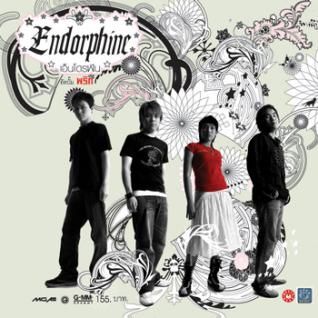
Abb.: ©CD-Titel
|
Endorphine (Thai: เอ็นโดรฟิน) sind eine thailändische Rockband. Sie sind heute eine der bekanntesten Bands Thailands, ihr Aushängeschild ist die Sängerin Da (ดา, 1986 - ). GeschichteDie Geschichte der Band geht zurück bis in die Junior High School, als die Freunde Bomb (บอมบ์, 1984 - , Schlagzeug) and Kia (เกี้ย, 1983 - , Gitarre) sich entschlossen eine Band zu gründen. Sie fragten Bombs Bruder Bird (เบิร์ด, 1986 - , Bass) ob er nicht mit machen wolle. Als sie die kraftvolle Stimme Da's (ดา, 1986 - ) hörten, fragten sie, ob sie nicht als Sängern der Band beitreten möchte. Im Stau entdeckten sie einen Aufkleber am Auto davor. Auf dem stand „endorphine“. Es wurde der Name für die Band. Endorphin ist eine chemische Substanz, welche vom Gehirn produziert wird, wenn jemand glücklich ist oder Schmerzen verspürt. Zu Beginn traten sie bei Musikwettbewerben auf und verbesserten ihre musikalischen Fähigkeiten. In einem Studio nahmen sie dann eine Demoaufnahme auf. Der Besitzer des Studios, ein Produzent des Labels BullDog, hörte die Demoaufnahme und nahm sie unter Vertrag. Ein Jahr später erschien am 7. Juni 2004 das Debütalbum der vier Musiker mit dem Namen Prik (พริก, deutsch: ‚Chili‘). Das Debüt wurde ein Erfolg. Die Single Purn-Sa-Nit (เพื่อนสนิท) aus dem Album wurde zur Nummer Eins der thailändischen Charts. Im Herbst 2005 erschien das nächste Album Sug Ga Wa 49 (สักวา 49). Seit 2007 ging die Band vorerst getrennte Wege. Sängerin Da brachte unter dem Künstlernamen „Da Endorphine“ (ดาเอ็นโดรฟิน)ihr erstes Soloalbum im Jahr 2007 heraus. Es trug den Titel Parb Luang Tar (ภาพลวงตา), auch das „Rote Album“ genannt, aufgrund des roten Kleides, welches sie auf dem Cover trägt. Es ist ein ruhiges und dennoch kraftvolles Album, was vor allem durch das Schlagzeug und die Stimme Das geprägt wird.
Am 26. Januar 2008, erschien das nächste Werk von Da. Es trägt den Titel Sound About. 2008 wurde Da mit dem Preis der „Besten weiblichen Künstlerin“ mit dem Star Entertainment Award ausgezeichnet. Endorphine absolvieren auch Konzerte außerhalb Thailands. MitgliederDie Spitznamen nachfolgend in Klammern.
[Quelle: http://de.wikipedia.org/wiki/Endorphine_%28Band%29. -- Zugriff am 2013-04-09] |
2004-06-10
Premiere des Films The Sin (ชู้) von Ong-Art Singlumpong (องอาจ สิงห์ลำพอง)
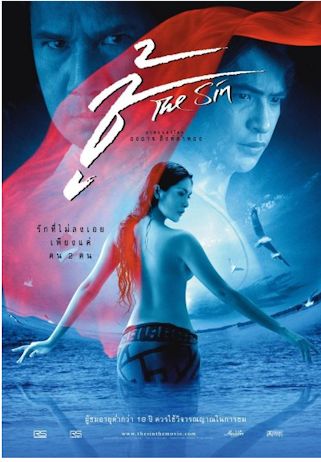
Abb.: Plakat
[Fair use]
|
"Strand der Sehnsucht (Originaltitel: Choo, Thai: ชู้, Aussprache: [ʧúː], wörtl: ein Mann, der ein Verhältnis mit einer verheirateten Frau hat) ist ein thailändischer und südkoreanischer Erotik-Thriller des Unternehmens R.S. Film. Er wurde nach einem Skript von Vatinee Orakorn verfilmt und bereits in mehrere Sprachen übersetzt. Der Film wird in Südostasien unter dem Namen Choo (ชู้) vertrieben, der internationale Filmtitel lautet The Sin. Seine Erstvorführung hatte der Film 2004 bei den Internationalen Filmfestspielen von Cannes. Die deutsche Erstausstrahlung erfolgte am 3. Juli 2007 im ZDF. HandlungRiam (เรียม) lernt auf einem thailändischen Markt den jungen Fotografen Thep (เทพ) kennen. Beide sind sich sehr sympathisch und kommen sich schließlich näher. Zu diesem Zeitpunkt wissen die Beiden jedoch nicht, dass Riam Theps Stiefmutter ist. Theps Vater hatte die junge Frau aus einer Notlage gerettet und beide verliebten sich. Die Heirat fand daraufhin in beidseitiger Dankbarkeit statt. Als Thep nach seinen Auslandsstudium wieder in das Haus seines Vaters zurückkehrt, kann er die Gedanken an seine neue Geliebte nicht mehr verdrängen. Riam liebt Thep ebenfalls heiß und innig und fühlte sich das erste Mal als Mensch wahrgenommen. Als der Vater Theps verreist, nutzt das glückliche Paar die Gelegenheit, um sich noch mehr näher zu kommen. Es beginnt eine gefährliche Dreiecksbeziehung. Besetzung
[Quelle: http://de.wikipedia.org/wiki/Strand_der_Sehnsucht. -- Zugriff am 2013-03-21] |
2004-06-16
Tod von Thanom Kittikachorn (ถนอม กิตติขจร, geb. 1911)
Abb.: Thanom Kittikachorn (ถนอม กิตติขจร)
[Bildquelle: th.Wikipedia. -- Fair use]
"Thanom Kittikachorn, thailändisch ถนอม กิตติขจร, (* 11. August 1911 in Ban Nhong Ploung, Provinz Tak (ตาก); † 16. Juni 2004 in Bangkok) war ein thailändischer General und Politiker. Politische Laufbahn
Nach der Schulausbildung ging Kittikachorn 1929 zum Militär, wo er 1951 zum General avancierte. Er unterstützte den Staatsstreich von Sarit Dhanarajata (สฤษดิ์ ธนะรัชต์), war Premierminister und Verteidigungsminister vom 24. Dezember 1957 (offiziell 1. Januar 1958) bis zum 20. Oktober 1958, sowie - nach Sarits Tod - erneut ab dem 9. Dezember 1963 bis zum 11. März 1969. Am gleichen Tag begann seine dritte Amtszeit, die bis zum 14. Oktober 1973 dauerte. Zwischen der ersten und zweiten Amtszeit war er in gleichen Funktionen als Stellvertreter tätig. 1964 wurde er zum Feldmarschall ernannt.
Kittikachorn spielte in dem Vierteljahrhundert seiner politischen Tätigkeit eine zentrale Rolle in Thailand. Er war ein Vertreter der herrschenden Oberschicht, des Militärs, eines harschen pro-amerikanischen und antikommunistischen Kurses, ein Gegner des Parlamentarismus, auch des 1969 wieder zugelassenen Parlaments. Mehrfach war er an Staatsstreichen beteiligt, die er immer mit dem Hinweis auf äußere und innere Gefahren für den Staat rechtfertigte.
Den Staatsstreich vom 17. November 1971, den er aus der Position des Premierministers heraus lostrat, begründete er mit der Notwendigkeit, das Land vor innerer Zersetzung und der prokommunistischen Guerillabewegung retten zu müssen. Er konzentrierte die gesamte Macht auf seine Person, verhängte das Kriegsrecht und löste das Parlament auf. Am 14. Oktober 1973 wurde seine Militärjunta nach Studentenprotesten, bei denen 77 Menschen umkamen, gestürzt, Kittikachorn ging ins Exil.
Massaker an StudentenDie Versuche der zivilen Nachfolgeregierungen, in Thailand demokratische Reformen umzusetzen, waren nur von begrenztem Erfolg. Die am 19. September 1976 erfolgte Rückkehr Kittikachorns aus Singapur führte zu Studentendemonstrationen, die nach Maßnahmen der am 23. September 1976 umgebildeten Regierung am 6. Oktober 1976 im Massaker vom 6. Oktober 1976 blutig niedergeschlagen wurden, bei dem 300 Studenten getötet wurden.
Letzte JahreKittikachorn trat noch einmal an die Öffentlichkeit, als er im März 1999 von Premierminister Chuan Leekpai (ชวน หลีกภัย) für die königliche Ehrengarde nominiert wurde. Am 16. Juni 2004 starb er im General Hospital von Bangkok, nachdem er im Januar 2004 einen Herzanfall erlitten hatte."
[Quelle: http://de.wikipedia.org/wiki/Thanom_Kittikachorn. -- Zugriff am 2011-10-06]

"Thanom died at the age of 92 on 16 June 2004 in Bangkok General Hospital, after suffering a stroke and a heart attack in January 2004. His medical expenses were paid by King Bhumibol Adulyadej (ภูมิพลอดุลยเดช). His cremation was held on 25 February 2007 at Wat Debsirin (วัดเทพศิรินทร์ฯ). Queen Sirikit (สมเด็จพระนางเจ้าสิริกิติ์ พระบรมราชินีนาถ) presided over the cremation ceremony, lighting the royal flame on behalf of King Bhumibol. Princess Chulabhorn (จุฬาภรณวลัยลักษณ์) also presided." [Quelle: http://en.wikipedia.org/wiki/Thanom_Kittikachorn. -- Zugriff am 2012-01-02]
2004-06-17
Premiere des Films Art of the Devil (คนเล่นของ) von Thanit Jitnukun (ธนิตย์ จิตนุกูล, 1956 - )
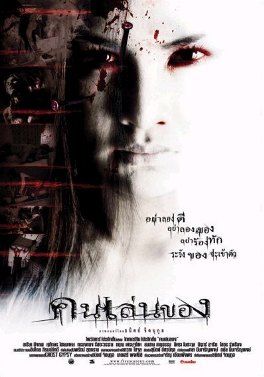
Abb.: Plakat
[Bildquelle: Wikipedia. -- Fair use]
|
"Art of the Devil (Thai: คนเล่นของ, Khon Len Khong) ist ein thailändischer Horrorfilm/Thriller aus dem Jahr 2004 und der erste Teil einer Horrorfilmtrilogie, wobei die Fortsetzungen nur rudimentäre Bezüge zum ersten Teil aufweisen. Regie führte Thanit Jitnukun. (ธนิตย์ จิตนุกูล, 1956 - ) HandlungDie thailändische Millionärstochter Nan (แนน) stellt ihrer attraktiven Freundin Boom (บุ๋ม) den wohlhabenden älteren Prathan vor. Er ist Nans Vater, was Boom allerdings nicht weiß. Unwissentlich initiiert Nan so eine verhängnisvolle und tragische Geschichte, welche in einem düsteren Szenario endet. Die junge Boom beginnt eine leidenschaftliche Affäre mit dem verheirateten Architekten Prathan (ประธาน). Als Boom schwanger wird, offenbart sie sich ihrem älteren Geliebten, der allerdings einem gemeinsamen Kind äußerst skeptisch gegenübersteht und sich mit der Zahlung von einer Million Baht allen Vaterpflichten entziehen will. Das Verhältnis zum Millionär kühlt sich schlagartig ab. Der werdende Vater favorisiert einen Schwangerschaftsabbruch. Eines Tages lädt Prathan seine Liebhaberin in sein Strandhaus ein, wo er sie demütigt und von drei seiner betrunkenen Freunde vergewaltigen lässt. Er selbst zeichnet das Martyrium der jungen Frau mit einer Handkamera auf. Wenige Tage später taucht die selbstbewusste Boom in erpresserischer Absicht ungemeldet bei einer Familienfeier des Architekten auf, um mehr Geld von ihrem Ex-Geliebten zu verlangen. Ihre Begegnung endet für die naive Frau unglücklich, sie wird erneut gedemütigt, misshandelt und schließlich verstoßen. Der wütende Prathan verweigert weitere Geldzuwendungen und verlangt, dass sie das Baby unverzüglich abtreiben lässt. Um sich an ihren Liebhaber und ihren Peinigern zu rächen, entwickelt Boom in ihrem Zorn Rachegelüste. Mit Hilfe eines Schamanen bedient sie sich der schwarzen Magie. Etwa sechs Monate später erschüttert eine mysteriöse Mord bzw. Selbstmordserie das Land. Diese richtet sich allerdings nicht nur gegen die verantwortlichen bzw. beteiligten Peiniger wie Prathan und die übrigen Vergewaltiger, sondern umfasst auch fast Prathans vollständige Familie. Die egozentrische Boom wähnt sich daraufhin am Ziel ihrer Träume, allerdings wird sie von den Geistern der Ermordeten bedrängt und in einen schweren Verkehrsunfall verwickelt. Sie verliert schließlich ihr Ungeborenes. Nach diesem Schicksalsschlag erfährt sie, dass Prathans Ex-Frau Kamala (กมลา), von deren Existenz sie bis zu diesem Zeitpunkt nichts ahnte, das beträchtliche Vermögen mit ihren fünf Kindern Woon, Neng (เหน่ง), Bon (บอล), Ruj (รุจน์) und Nan (แนน) zugesprochen wird. Die Mörderin geht völlig leer aus. Boom kann und will sich allerdings nicht damit abfinden und bandelt mit Ruj an, einem erwachsenen Sohn Kamalas, den sie wenig später sogar heiratet, um die Familie zu infiltrieren. Die exzentrische Massenmörderin erhebt heimlich Ansprüche auf die stattliche Villa und kontaktiert daher erneut den Schamanen, was weitere Morde zur Folge hat. Zwischenzeitlich geht der Reporter Danai (ดนัย) den Ursachen der mysteriösen Geschehnisse mit Todesfolge nach und vermutet folgerichtig einen Zusammenhang zwischen den Todesfällen und schwarzer Magie. Bevor er und die abergläubische Nan, die ebenfalls von dunklen Mächten überzeugt ist, einen Durchbruch bei ihren Ermittlungen erzielen können, sterben allerdings weitere erbberechtigte Geschwister. Die verantwortungsbewusste Nan und der engagierte Danai finden schließlich heraus, dass alle Spuren zu Boom, Nans Schwägerin, führen. Da diese sich jedoch weiterhin der dunklen Magie bedient, ist sie für die beiden Ermittler zunächst fast unantastbar. Erst als es Danai gelingt den Magier in selbstmörderischer Absicht ausfindig zu machen und ihn letztlich zu töten, gelingt es Nan Boom in einem Handgemenge zu töten. Danai findet einen grausamen Flammentod. Am Ende des Films überlebt lediglich Nan, sowie ihr kleiner Bruder Bon. Besetzung
Kritiken „Horror- und Gespensterfilm mit den in Ostasien beliebten Geisterfrauen und -mädchen, der freilich nicht auf den stillen Schrecken hin inszeniert ist, sondern seine überforderten Darsteller Strömen von Blut aussetzt.“ – Lexikon des Internationalen Films [1]" [Quelle: http://de.wikipedia.org/wiki/Art_of_the_Devil. -- Zugriff am 2013-03-21] |
2004-06-19
Ein armer junger Mann, Patcharapon "Wit" Chantiang (พชรพล "วิทย์" จั่นเที่ยง, 1977 - ), bekommt in Academy Fantasia (อะคาเดมี่ แฟนเทเชีย) die meisten SMS-Stimmen und gewinnt ein Haus im Wert von 4 Mio. Baht. Die Fans sind begeistert.
Abb.: ®Logo
[Bildquelle: th.Wikipedia]
"Academy Fantasia (อะคาเดมี่ แฟนเทเชีย) (or True Academy Fantasia - ทรู อะคาเดมี่ แฟนเทเชีย) is a reality show held in Thailand. It is a singing contest, judged through popular votes. Overview
Created by cable TV provider TrueVisions (ทรูวิชั่นส์), formerly known as United Broadcasting Corporation (UBC), Academy Fantasia is currently airing its sixth season. Academy Fantasia is a franchise of La Academia, a popular reality TV show from Mexico. The contestants are selected through nationwide auditions, as well as through online audition clips. The live auditions take place in major cities in every part of Thailand to search for those who dream about becoming superstars. Four judges will eliminate thousands of people down to top 100 then last twelve or more finalists into the Academy House for study.
The contestants live in the same house with hundreds of hidden cameras. Audiences can watch them 24 hours live on TV and online. Each week the contestants are assigned individual songs and sometimes group songs to perform on stage every Saturday until the last week of the show. The contestants attend voice class, dance class, and acting class to practice the songs that they perform.
The audiences can vote for their favorite contestants through cell phones and land phones. It costs three baht for each vote. The show usually airs 24 hours on True Vision 20 (digital) and 16 (analog) and the concerts will be broadcast live on True Music Channel (Digital:26 , Analog:30) and ModernNine TV (public channel 9) every Saturday night between 20:40-23:10 Thailand time.
After each performance the commentators will evaluate the performance. At the end of the concert, the contestant(s) who received the lowest percentage of audience votes will have to leave the show. The winners of the first five seasons were all male and was the first female in the season 6. The winners and the runner-ups will automatically receive record deals with True Fantasia record label. After the end of each season, there is a nationwide concert tour starring the top 12 finalists.
ControversyIt is rumored that the show is rigged, with the winner having already been chosen since early on in the season, and that each season is manipulated in such a way that True receives the highest ratings as possible. Also, the voting is set up so that live rankings are shown online from the starting day of votes (Monday) through Friday, which is the day before the voting closes. This gives True approximately 24 hours to manipulate the vote in whatever way it wishes, and potentially gives it the opportunity to hand-choose which contestants will remain and which will be eliminated. However, none of those in charge of the show have admitted that there is any manipulation of voting results.
Critics claim that the various publicity stunts alone are enough evidence to suggest that such manipulations are occurring. For instance, the show's unexpected move of inviting contestants back into the running (as in seasons 2, 4, and 5) and all of the times that it went against the viewers' expectations by eliminating (or not eliminating) male or female contestants each week are obvious manipulations for higher ratings and more voting (meaning more money for telephone company True). In True's defense, these unexpected actions create the suspense one would expect to see in any television show. However, in a show that promises that the people have ultimate power (through their votes) in who stays or leaves, such manipulations, if they are occurring, are unacceptable."
[Quelle: http://en.wikipedia.org/wiki/Academy_fantasia. -- Zugriff am 2012-01-02]
2004-06-21
Der Umweltaktivist Charoen Wat-aksorn (เจริญ วัดอักษร, 1967 - 2004 ) wird erschossen, als er von Bangkok zurückkehrt, wo der das House Committe of Corruption gebeten hatte, den geplanten Bau zweier Kohlekraftwerke in der Provinz Prachuap Khiri Khan (ประจวบคีรีขันธ์) zu untersuchen. Die beiden Mörder sterben 2008 auf rätselhafte Weise im Gefängnis.
Abb.: Charoen Wat-aksorn (เจริญ วัดอักษร, 1967 - 2004 )
[Bildquelle: Greenpeace. -- use for educational purposes]
Abb.: Lage der Provinz Prachuap Khiri Khan (ประจวบคีรีขันธ์)
[Bildquelle: CIA. -- Public domain]
2004-06-21
Ein Gericht verurteilt Somchai Khunpluem (สมชาย คุณปลื้ม, 1937 - ), besser bekannt als Kamnan Poh (กำนันเป๊าะ), den ("godfather" of Chonburi - ชลบุรี), zu 25 Jahren Haft, da er Killer angeheuert hatte, die einen seiner Geschäftskonkurrenten ermordeten.
Abb.: Lage der Provinz Chonburi (ชลบุรี)
[Bildquelle: OpenStreetMap. -- Creative Commons Lizenz (Namensnennung, share alike)]
2004-06-23

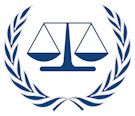
Die USA ziehen den Antrag zurück, dass US-Bürger weitere 12 Monate vor dem Internationalen Strafgerichtshof (International Criminal Court) immun sein sollen. Seit Juli 2002 hatten die USA zweimal Ausnahmeregelungen für je 12 Monate durchgesetzt.
2004-06-24
Premiere des Films The Letter (เดอะเลตเตอร์ จดหมายรัก) von Pa-oon Chantarasiri (ผอูน จันทรศิริ, 1962 - )
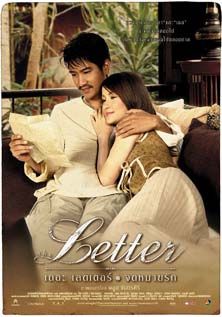
Abb.: Plakat
[Bildquelle: Wikipedia. -- Fair use]
|
"The Letter (Thai: เดอะเลตเตอร์ จดหมายรัก or Jod mai rak, literally "love letter") is a 2004 romance-drama film directed by Pa-oon Chantarasiri. (ผอูน จันทรศิริ, 1962 - ) It is a remake of Pyeon ji (편지), a 1997 South Korean film by director Lee Jeong-Kuk (이정국). PlotDew (ดิว) (Anne Thongprasom - แอน ทองประสม, 1976 - ) is a young computer programmer who meets Ton (Attaporn Teemakorn - อรรถพร ธีมากร, 1973 - ) in Chiang Mai (เชียงใหม่) during her distant cousin's funeral. They immediately become attracted to each other and start to date each other over the phone. Back in Bangkok on Valentine's Day, Dew refuses to accompany her best friend, Ked (เกด) (สุพิชญา จุลวัฒฑะกะ), to a blind date because she is anxiously waiting for Ton's phone call. The consequence of this breaks Dew's heart as her friend is murdered by the blind date. Dew immediately leaves for Chiang Mai and finds comfort in Ton. The two start a serious relationship and marry soon after. However, their new-found happiness is cut short when Ton dies of a brain tumor. Dew is again left alone. Before leaving for Bangkok, she receives a mysterious letter, seemingly from her dead husband. As it turns out, Ton had written a series of letters prior to his death and arranged for them to be sent after his death to his widow. The letters help Dew through her grief. She finally is able to live without the love of her life and continues to live in Chiang Mai with their son, born after the death of his father. Production and releaseThe Letter was the last film produced by Duangkamol Limcharoen (ดวงกมล ลิ่มเจริญ, 1964 - 2003) before she died on December 8, 2003, at age 39. Director Pa-oon Chantarasiri, making her first feature film, agreed to take on the project, as a favor to her producer-friend. [1] Starring popular Thai soap opera actress Anne Thongprasom (แอน ทองประสม, 1976 - ), the film was a hit at the local box office. Facial tissues were handed out in front of cinemas for free in anticipation of the audiences' reactions to the final scenes. "It's an effective melodrama, a movie of well-executed cliches and retro sensibilities," wrote Bangkok Post film critic King Rithdee. "But only Anne's performance – especially her ability to switch on a fountain of tears – conceals the insubstantial nature of the film's build-up and its banal, I-love-you-forever kind of dialogue. Don't forget to bring a handkerchief. Or better still, a towel."[2] Variety critic Russell Edwards called the film "slow-moving" and "glossy". "[It] doesn't just tug on the heartstrings but uses them to drop anchor in a sea of schmaltz."[3] Festivals and awardsAnne Thongprasom won for Best Actress at the Thailand National Film Association Awards (รางวัลภาพยนตร์แห่งชาติ สุพรรณหงส์). The film also won for Best Original Song, "Mai Mee Chai Mai" (ไม่มี..ใช่ไหม ), by Chartchai Pongprapapan (ชาติชาย พงษ์ประภาพันธ์). The Letter was screened at the 2004 Pusan International Film Festival (부산국제영화제)." [Quelle: http://en.wikipedia.org/wiki/The_Letter_%282004_film%29. -- Zugriff am 2013-03-21] |
2004-06-24

Interview von Pattana Kitiarsa (พัฒนา กิติอาษา) mit dem weiblichen Medium Tante (ป้า) Toi in Khorat [โคราช]:
"A wooden board hanging in front of her house advertises her business as follows: The Pu Khao Khiao [ภูเขาเขียว] Spirit Shrine (Achan Toi).
No spirit possession on Buddhist days of worship.
Specialization and services:
- fortune-telling,
- life-enhancing ritual,
- setting up spirit shrines, and
- organizing the ritual of paying homage to teachers’ spirits.
Providing services for all types of soul calling ceremonies and misfortune reduction rituals.
Paying homage to teacher fee: forty-nine baht.
Thank you everyone."
Aunt Toi mentioned that most of the visitors to her shrine are women rather than men. Most of them are also working-class people who live in downtown Khorat [โคราช] and nearby areas such as Chokchai [โชคชัย], Pakthongchai [ปักธงชัย], and Si Khiao. Their occupations include market vendors, factory laborers, and pedicab drivers. Sometimes there are civil servants, college students, and businesspeople as well. With over thirty years’ experience, Aunt Toi categorizes her clients or followers as follows:
The Sino-Thai seek advice on their business matters. The native Thai (Khorat) have problems with major and minor wives, and ask questions pertaining to their respective jobs and fortunes. Civil servants, soldiers, and police officers are concerned with their annual promotions and bosses’ preferences. Students are serious about their examinations. Sometimes young men also wish to learn about their upcoming military conscription, since they do not want to spend a period of two years in the military."
[Quelle: Pattana Kitiarsa [พัฒนา กิติอาษา] <1968-2013>: Mediums, monks, and amulets : Thai popular Buddhism today. -- Chiang Mai : Silkworm, [2012]. -- 170 S. : Ill ; 21 cm. -- ISBN 9786162150494. -- S. 48]
ausführlich: http://www.payer.de/thailandchronik/ressourcen.htm
Zu Chronik 2004 / B. E. 2547. -- 3. Juli bis Dezember